Center for Indigenous Health Research
Since 2007, Maya Health Alliance has been a leader in developing practical solutions to improve the quality of medical care in rural and indigenous communities in Guatemala. The Center for Indigenous Health Research (Centro de Investigación en La Salud Indígena or CISI) was founded by a multidisciplinary group of researchers at Maya Health Alliance, with the goals of advancing scientific investigations into the health needs of these communities.
Central Research Topics
The central CISI Research themes share methodological approaches, especially mixed methods, applied anthropology and implementation science:
-
Chronic Malnutrition and Food Security
-
Noncommunicable diseases, such as cancer, diabetes, and chronic kidney disease
-
Civil Society and the study of Development and Gender Equity in health
-
Early child development
-
Family planning
-
Midwifery and Emergency Obstetrics
-
Medical Anthropology
Research Projects
Summary of major current and recent projects
LOCAL ADVOCACY AND THE POWER OF COMMUNITY FOR COVID RECOVERY. (2023-)

This interdisciplinary project will draw together scholars of, and community organizations in, Canada, Brazil, and Guatemala. It will explore the pandemic lived experiences of ‘small’ and ‘local’ health and service organizations and activists.
PARTNERS: University of Manitoba
FUNDING: New Frontiers in Research Fund
IMPLEMENTATION OF A NATIONAL MODEL FOR DIABETES AND HYPERTENSION TREATMENT IN GUATEMALA. (2024-)
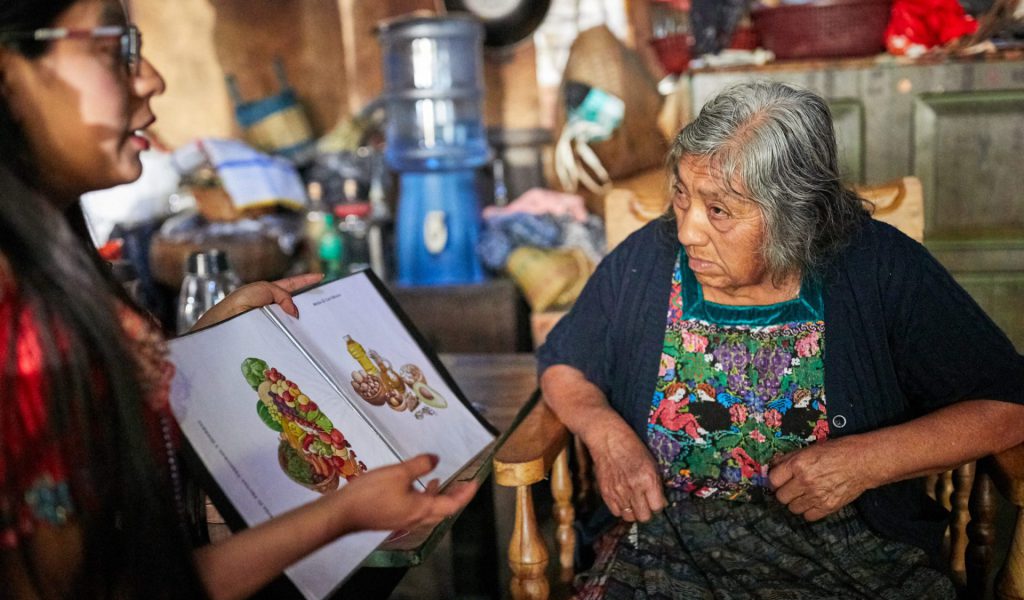
This project is working in collaboration with the Ministry of Health and INCAP to scale up diabetes and hypertension treatment in public health facilities around the country.
PARTNERS: INCAP
FUNDING: World Diabetes Foundation
ARTIFICIAL INTELLIGENCE AND QUALITY IMPROVEMENT TO REDUCE NEONATAL MORTALITY. (2024-)
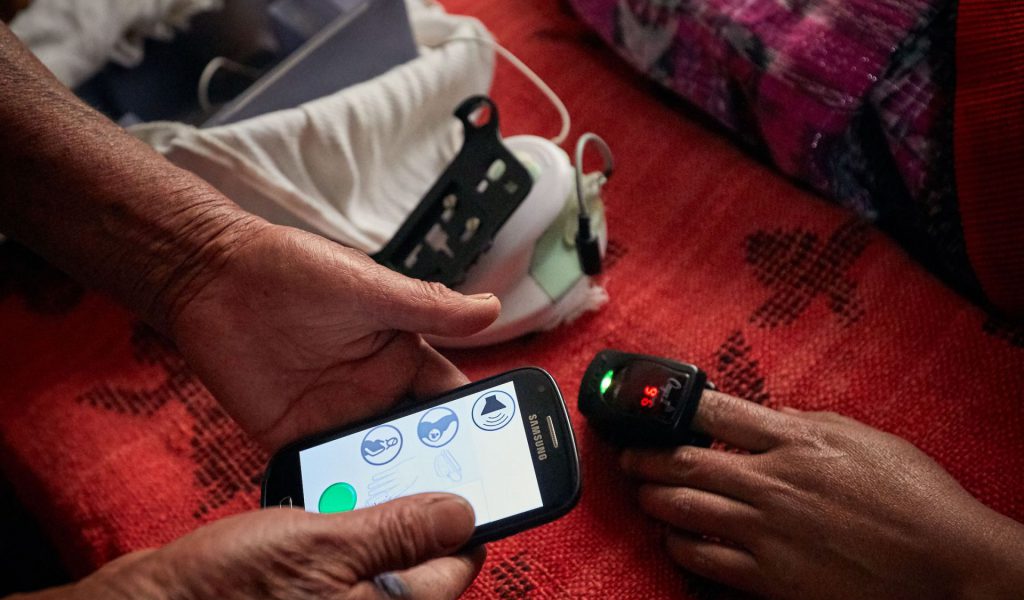
This project builds on Wuqu’ Kawoq’s long standing Mobile Health Program, but now focusing on specific quality improvement initiatives (include enhanced real-time smartphone decision support) to detect neonatal complications and prevent neonatal deaths.
PARTNERS: Emory University
FUNDING: Google Nonprofit Foundation
AI-DRIVEN LOW-COST ULTRASOUND FOR AUTOMATED QUANTIFICATION OF HYPERTENSION, PREECLAMPSIA, AND IUGR (2023-)
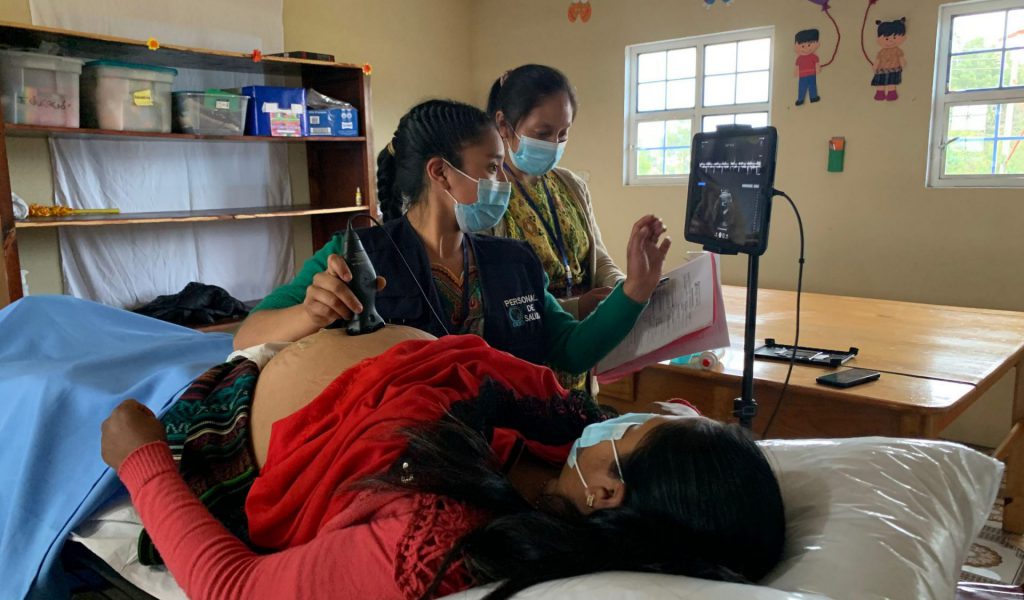
In low-resource settings, high rates of perinatal mortality are due in part to challenges accessing affordable technologies to screen and monitor high-risk maternal-fetal conditions, such as intrauterine growth restriction and preeclampsia. To address these issues, we will use artificial intelligence to develop techniques for predicting intrauterine growth restriction and preeclampsia from low-cost hand-held maternal and fetal Doppler recordings.
PARTNERS: Emory UniversityFUNDING: NIH/NICHD
PUBLICATIONS:
Katebi N, Sameni R, Rohloff P, Clifford GD. Hierarchical Attentive Network for Gestational Age Estimation in Low-Resource Settings. IEEE J Biomed Health Inform. 2023 May;27(5):2501-2511.
Katebi N, Bremer W, Nguyen T, Phan D, Jeff J, Armstrong K, Phabian-Millbrook P, Platner M, Carroll K, Shoai B, Rohloff P, Boulet SL, Franklin CG, Clifford GD. Automated image transcription for perinatal blood pressure monitoring using mobile health technology. PLOS Digit Health. 2024 Oct 2;3(10):e0000588. doi: 10.1371/journal.pdig.0000588.
Ramos E, Piló Palax I, Serech Cuxil E, Sebaquijay Iquic E, Canú Ajqui A, Miller AC, Chandrasekeran S, Hall-Clifford R, Sameni R, Katebi N, Clifford GD, Rohloff P. Mobil Monitoring Doppler Ultrasound (MoMDUS) study: protocol for a prospective, observational study investigating the use of artificial intelligence and low-cost Doppler ultrasound for the automated quantification of hypertension, pre-eclampsia and fetal growth restriction in rural Guatemala. BMJ Open. 2024 Sep 10;14(9):e090503. doi: 10.1136/bmjopen-2024-090503.
PUBLICATIONS:
Katebi N, Sameni R, Rohloff P, Clifford GD. Hierarchical Attentive Network for Gestational Age Estimation in Low-Resource Settings. IEEE J Biomed Health Inform. 2023 May;27(5):2501-2511.
Katebi N, Bremer W, Nguyen T, Phan D, Jeff J, Armstrong K, Phabian-Millbrook P, Platner M, Carroll K, Shoai B, Rohloff P, Boulet SL, Franklin CG, Clifford GD. Automated image transcription for perinatal blood pressure monitoring using mobile health technology. PLOS Digit Health. 2024 Oct 2;3(10):e0000588. doi: 10.1371/journal.pdig.0000588.
Ramos E, Piló Palax I, Serech Cuxil E, Sebaquijay Iquic E, Canú Ajqui A, Miller AC, Chandrasekeran S, Hall-Clifford R, Sameni R, Katebi N, Clifford GD, Rohloff P. Mobil Monitoring Doppler Ultrasound (MoMDUS) study: protocol for a prospective, observational study investigating the use of artificial intelligence and low-cost Doppler ultrasound for the automated quantification of hypertension, pre-eclampsia and fetal growth restriction in rural Guatemala. BMJ Open. 2024 Sep 10;14(9):e090503. doi: 10.1136/bmjopen-2024-090503.
AFLATOXIN EXPOSURE, GROWTH FALTERING, AND THE GUT MICROBIOME AMONG CHILDREN IN RURAL GUATEMALA (2023-)
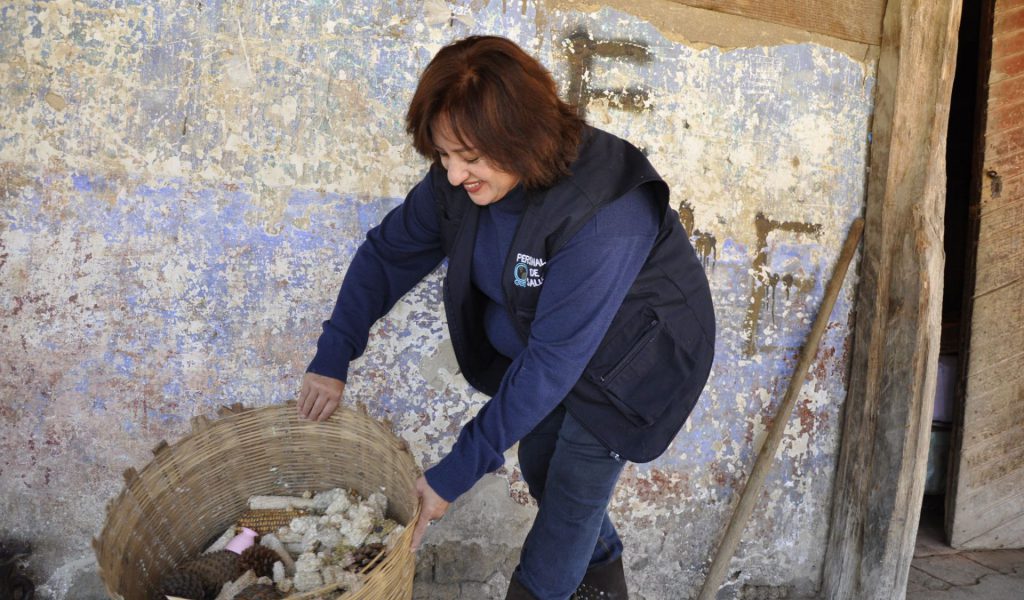
We will study the role of aflatoxin exposure on child growth, and whether the effect of aflatoxin is mediated by the gut microbiome and inflammation. We will evaluate aflatoxin exposure and examine markers of inflammation, gut microbiome composition and function, and microbial nutrient extraction and aflatoxin microbial biotransformation.
PARTNERS: ASU- Arizona State University
FUNDING: NIH/NIEHS
PUBLICATIONS:
Cheng Q, Glesener H, Montenegro G, Torres O, Miller AC, Krajmalnik-Brown R, Rohloff P, Voth-Gaeddert LE. Assessment of aflatoxin exposure, growth faltering and the gut microbiome among children in rural Guatemala: protocol for an observational prospective cohort and bioreactor simulations. BMJ Paediatr Open. 2023 Apr;7(1):e001960.
Glesener H, Abdollahzadeh D, Muse C, Krajmalnik-Brown R, Weaver MA, Voth-Gaeddert LE. X-ray Irradiation Reduces Live Aspergillus flavus Viability but Not Aflatoxin B1 in Naturally Contaminated Maize. Toxins (Basel). 2024 Jul 25;16(8):329. doi: 10.3390/toxins16080329.
PUBLICATIONS:
Cheng Q, Glesener H, Montenegro G, Torres O, Miller AC, Krajmalnik-Brown R, Rohloff P, Voth-Gaeddert LE. Assessment of aflatoxin exposure, growth faltering and the gut microbiome among children in rural Guatemala: protocol for an observational prospective cohort and bioreactor simulations. BMJ Paediatr Open. 2023 Apr;7(1):e001960.
Glesener H, Abdollahzadeh D, Muse C, Krajmalnik-Brown R, Weaver MA, Voth-Gaeddert LE. X-ray Irradiation Reduces Live Aspergillus flavus Viability but Not Aflatoxin B1 in Naturally Contaminated Maize. Toxins (Basel). 2024 Jul 25;16(8):329. doi: 10.3390/toxins16080329.
EXPLORING RISK FACTORS AND PREDICTORS OF ENDEMIC CKDU IN AGRICULTURAL REGIONS OF FOUR CENTRAL AMERICA COUNTRIES (2022-)
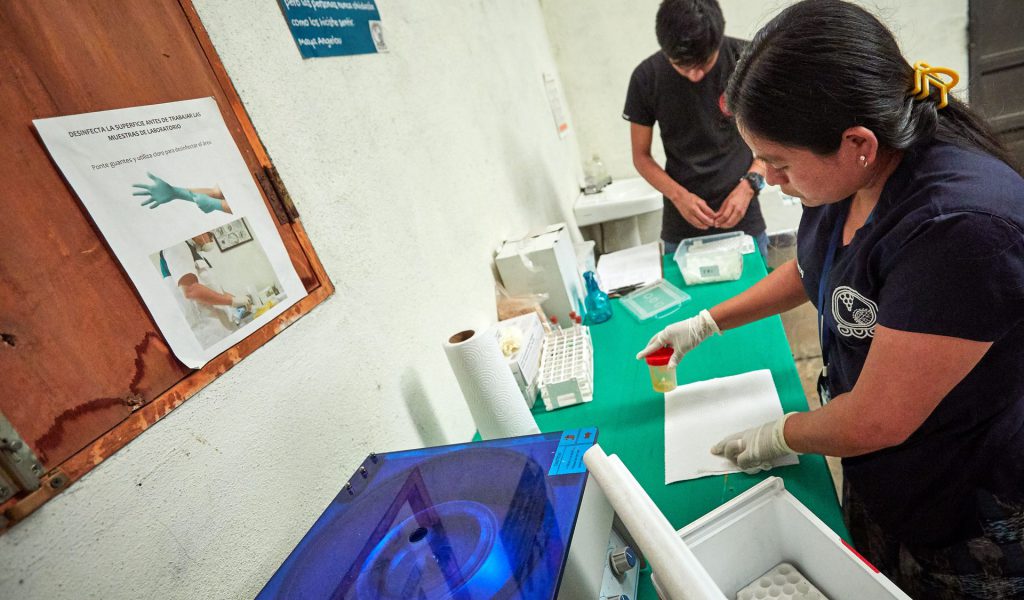
Chronic kidney disease of unknown origin (CKDu) has taken a terrible toll on young working families living in rural areas of Central America. This project aims to identify risk factors for CKDu and decline in kidney function in four Central American countries: Costa Rica, Panama, Nicaragua and Guatemala. This work will be conducted though the SALTRA (Central American Program for Health, Work and Environment) network connecting locally-based universities, NGOs, governmental organizations, public health authorities and local healthcare workers.
PARTNERS: Programa Salud, Trabajo y Ambiente (SALTRA), Universidad Nacional de Costa Rica
FUNDING: NIH/NIEHS/NIDDK
MOBILE HEALTH INTERVENTION TO PROMOTE POSITIVE INFANT HEALTH OUTCOMES IN GUATEMALA (2021-)
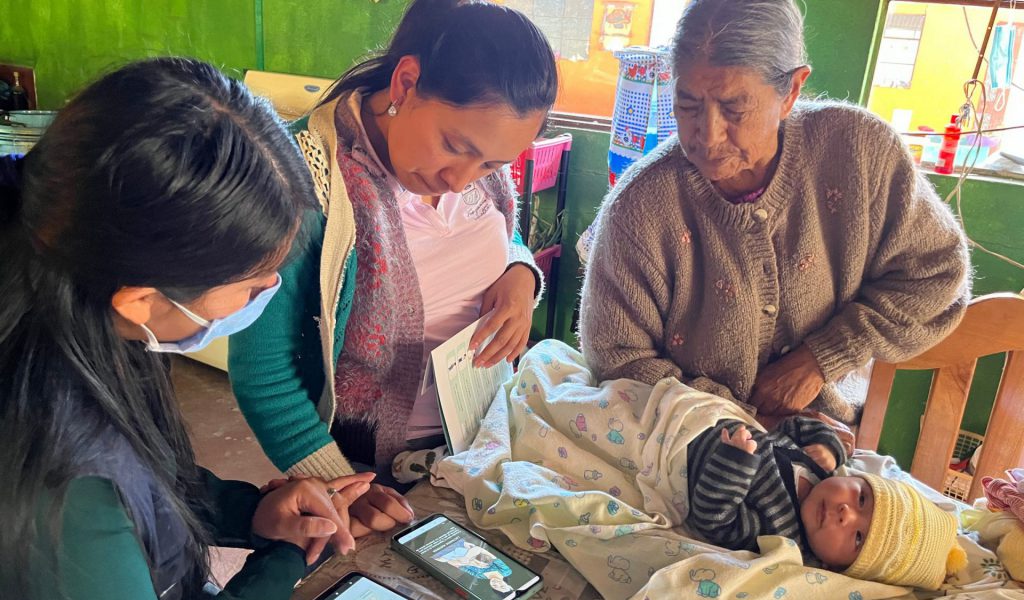
The objectives of this project are to develop and determine the effectiveness of an mHealth smartphone technology which can be used to engage primary caregivers directly in the active monitoring of their infants’ development, and to provide tailored feedback and support for the provision of nurturing care and positive infant developmental outcomes.
PARTNERS: CHLA-Children’s Hospital Los Angeles
FUNDING: NIH / NICHD (PI Beth Smith, Children’s Hospital Los Angeles) NCT05106894
A HYBRID EFFECTIVENESS/IMPLEMENTATION TRIAL OF THE INTERNATIONAL GUIDE FOR MONITORING CHILD DEVELOPMENT (2021-)
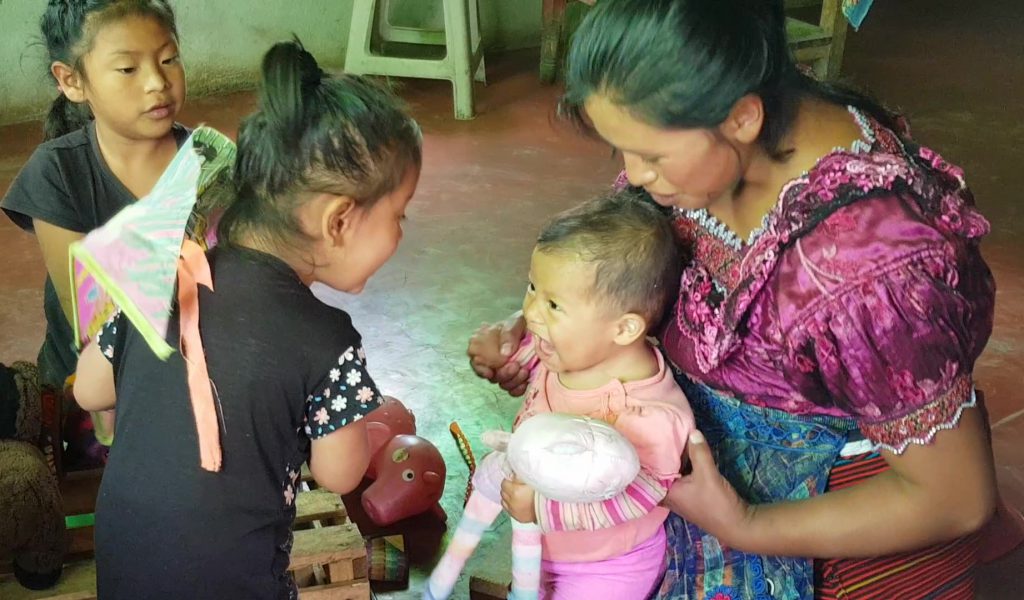
The aim of this study is to conduct a hybrid effectiveness/implementation assessment of the International Guide for Monitoring Child Development (GMCD) in two LMIC settings, India and Guatemala, within established rural CHW programs. The primary objectives are (a) to evaluate the real-world effectiveness of the GMCD; (b) to use an implementation science framework to understand barriers and facilitators to effective population coverage, provider implementation, and maintenance; (c) to conduct an economic evaluation of the GMCD.
PARTNERS: Brigham and Women’s Hospital
FUNDING: NIH / NICHD (PI Peter Rohloff, Brigham and Women´s Hospital, Inc.) NCT04665297
PUBLICATIONS:
Bandal A, Hernández S, Mustafa R, Choy K, Edwards N, Guarchaj M, Mejía Alvarez M, Sane A, Tschida S, Maliye C, Miller A, Raut A, Srinivasan R, Turner M, Wagenaar BH, Ertem I, Grazioso MDP, Gupta SS, Krishnamurthy V, Rohloff P. Methodology for adapting a co-created early childhood development intervention and implementation strategies for use by frontline workers in India and Guatemala: a systematic application of the FRAME-IS framework. Glob Health Action. 2024 Dec 31;17(1):2338324. doi: 10.1080/16549716.2024.2338324. Epub 2024 May 10. PMID: 38726569; PMCID: PMC11089920.
Raut A, Mustafayev R, Srinivasan R, Chary A, Ertem I, Grazioso MDP, Gupta S, Krishnamurthy V, Lu C, Maliye C, Miller AC, Wagenaar BH, Rohloff P. Hybrid type 1 effectiveness/implementation trial of the international Guide for Monitoring Child Development: protocol for a cluster-randomised controlled trial. BMJ Paediatr Open. 2021 Sep 15;5(1):e001254. doi: 10.1136/bmjpo-2021-001254. PMID: 34604546; PMCID: PMC8444252.
PUBLICATIONS:
Bandal A, Hernández S, Mustafa R, Choy K, Edwards N, Guarchaj M, Mejía Alvarez M, Sane A, Tschida S, Maliye C, Miller A, Raut A, Srinivasan R, Turner M, Wagenaar BH, Ertem I, Grazioso MDP, Gupta SS, Krishnamurthy V, Rohloff P. Methodology for adapting a co-created early childhood development intervention and implementation strategies for use by frontline workers in India and Guatemala: a systematic application of the FRAME-IS framework. Glob Health Action. 2024 Dec 31;17(1):2338324. doi: 10.1080/16549716.2024.2338324. Epub 2024 May 10. PMID: 38726569; PMCID: PMC11089920.
Raut A, Mustafayev R, Srinivasan R, Chary A, Ertem I, Grazioso MDP, Gupta S, Krishnamurthy V, Lu C, Maliye C, Miller AC, Wagenaar BH, Rohloff P. Hybrid type 1 effectiveness/implementation trial of the international Guide for Monitoring Child Development: protocol for a cluster-randomised controlled trial. BMJ Paediatr Open. 2021 Sep 15;5(1):e001254. doi: 10.1136/bmjpo-2021-001254. PMID: 34604546; PMCID: PMC8444252.
EFFECTS OF COMPLEMENTARY FEEDING OF EGGS ON INFANT DEVELOPMENT AND GROWTH IN GUATEMALA (2020-)
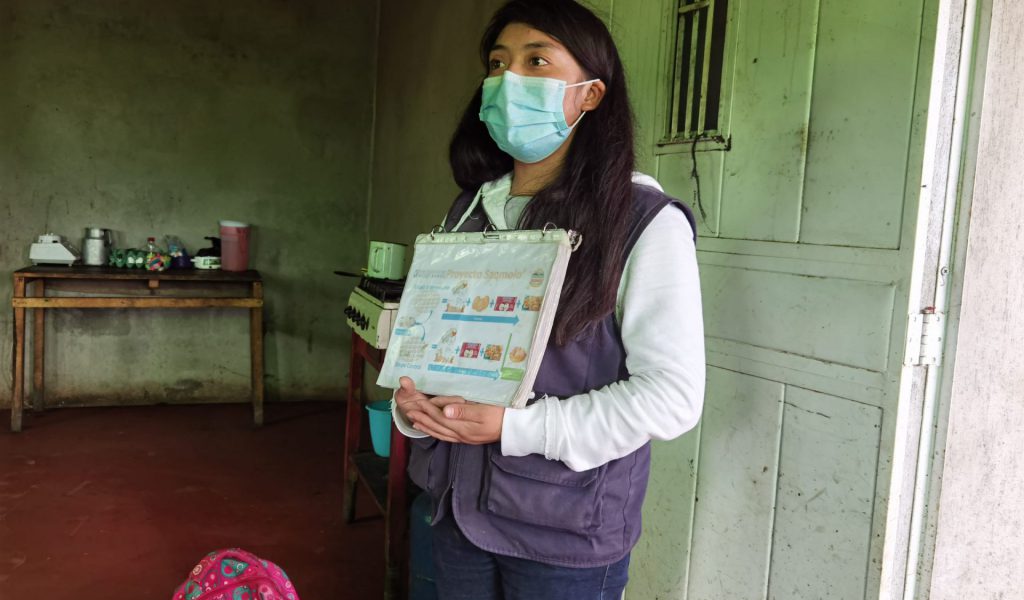
Investigating the impact of daily egg consumption during the period of complementary feeding, in addition to the standard nutritional care provided by Wuqu’Kawoq, compared to the local standard of nutritional care alone on childhood development.
FUNDING: American Academy of Nutrition and Dietetics NCT04316221
PUBLICATIONS:
Wallace TC, Montenegro-Bethancourt G, Rohloff P, Jimenez EY, Proaño GV, McCabe GP, Steiber A, Ruosch A, Laessig I, Ladwig E, You H. Comparison of the nutrient composition of eggs produced in the Guatemalan highlands during the wet and dry seasons. Food Sci Nutr. 2023 Oct 13;11(12):8163-8173. doi: 10.1002/fsn3.3736.
Wallace TC, Rohloff P, Jimenez EY, Proaño GV, Montenegro-Bethancourt G, McCabe GP, Steiber A. Academy of Nutrition and Dietetics Nutrition Research Network: The Saqmolo' Project Rationale and Study Protocol for a Randomized Controlled Trial Examining the Influence of Daily Complementary Feeding of Eggs on Infant Development and Growth in Guatemala. J Acad Nutr Diet. 2021 May 4:S2212-2672(21)00226-4. doi: 10.1016/j.jand.2021.03.015. Epub ahead of print. PMID: 33962902.
PUBLICATIONS:
Wallace TC, Montenegro-Bethancourt G, Rohloff P, Jimenez EY, Proaño GV, McCabe GP, Steiber A, Ruosch A, Laessig I, Ladwig E, You H. Comparison of the nutrient composition of eggs produced in the Guatemalan highlands during the wet and dry seasons. Food Sci Nutr. 2023 Oct 13;11(12):8163-8173. doi: 10.1002/fsn3.3736.
Wallace TC, Rohloff P, Jimenez EY, Proaño GV, Montenegro-Bethancourt G, McCabe GP, Steiber A. Academy of Nutrition and Dietetics Nutrition Research Network: The Saqmolo' Project Rationale and Study Protocol for a Randomized Controlled Trial Examining the Influence of Daily Complementary Feeding of Eggs on Infant Development and Growth in Guatemala. J Acad Nutr Diet. 2021 May 4:S2212-2672(21)00226-4. doi: 10.1016/j.jand.2021.03.015. Epub ahead of print. PMID: 33962902.
WEARABLE SENSORS FOR EARLY IDENTIFICATION OF POOR NEURODEVELOPMENT IN GUATEMALA (2019-2022)
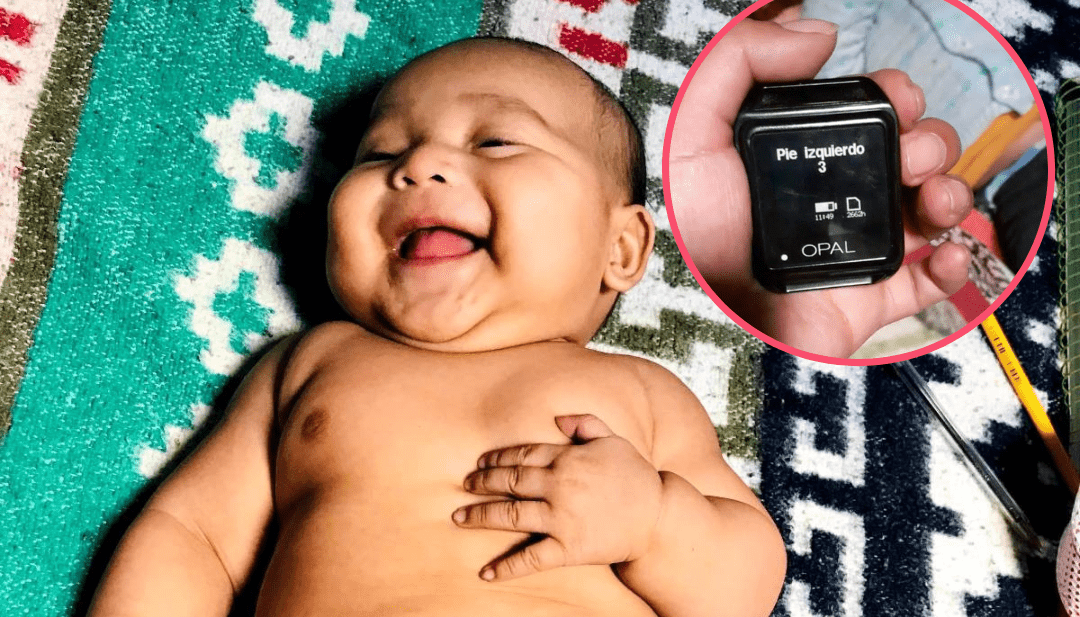
Evaluating new technology to detect early developmental delay in infants at risk.
PARTNERS: CHLA-Children’s Hospital Los Angeles
FUNDING: NIH / NICHD (PI Beth Smith, Children’s Hospital Los Angeles)
PUBLICATIONS:
Oh J, Ordoñez ELT, Velasquez E, Mejía M, Del Pilar Grazioso M, Rohloff P, Smith BA. Associating neuromotor outcomes at 12 months with wearable sensor measures collected during early infancy in rural Guatemala. Gait Posture. 2024 Sep;113:477-489. doi: 10.1016/j.gaitpost.2024.08.005. Epub 2024 Aug 8.
Oh J, Ordoñez ELT, Velasquez E, Mejía M, Grazioso MDP, Rohloff P, Smith BA. Early full-day leg movement kinematics and swaddling patterns in infants in rural Guatemala: A pilot study. PLoS One. 2024 Feb 29;19(2):e0298652.
Rosales MR, Rohloff P, Vanderbilt DL, Tripathi T, Valentini NC, Dusing S, Smith BA. Collecting Infant Environmental and Experiential Data Using Smartphone Surveys. Pediatr Phys Ther. 2021 Jan 01; 33(1):47-49.
Smith BA, Hall ML, Greenspan B, Rohloff P, Prosser LA, Lobo MA.Wearables for Pediatric Rehabilitation: How to Optimally Design and Utilize Products to Meet the Needs of Users. Phys Ther. 2019 Feb 27. pii: pzz024. doi: 10.1093/ptj/pzz024.
PUBLICATIONS:
Oh J, Ordoñez ELT, Velasquez E, Mejía M, Del Pilar Grazioso M, Rohloff P, Smith BA. Associating neuromotor outcomes at 12 months with wearable sensor measures collected during early infancy in rural Guatemala. Gait Posture. 2024 Sep;113:477-489. doi: 10.1016/j.gaitpost.2024.08.005. Epub 2024 Aug 8.
Oh J, Ordoñez ELT, Velasquez E, Mejía M, Grazioso MDP, Rohloff P, Smith BA. Early full-day leg movement kinematics and swaddling patterns in infants in rural Guatemala: A pilot study. PLoS One. 2024 Feb 29;19(2):e0298652.
Rosales MR, Rohloff P, Vanderbilt DL, Tripathi T, Valentini NC, Dusing S, Smith BA. Collecting Infant Environmental and Experiential Data Using Smartphone Surveys. Pediatr Phys Ther. 2021 Jan 01; 33(1):47-49.
Smith BA, Hall ML, Greenspan B, Rohloff P, Prosser LA, Lobo MA.Wearables for Pediatric Rehabilitation: How to Optimally Design and Utilize Products to Meet the Needs of Users. Phys Ther. 2019 Feb 27. pii: pzz024. doi: 10.1093/ptj/pzz024.
EVALUATING A FAMILY-BASED NUTRITION AND GARDEN INTERVENTION IN RURAL GUATEMALA (2019-2021)
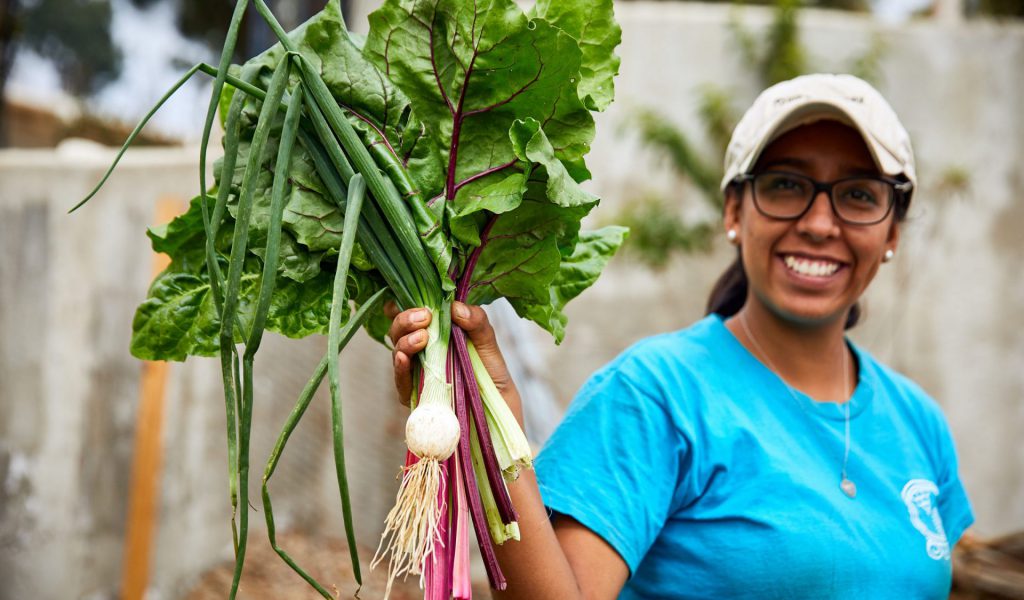
Investigating integration of home gardening into nutrition interventions to improve growth and diet quality for stunted children.
FUNDING: Academy of Nutrition and Dietetics. NCT03689504
PUBLICATIONS:
Alajajian S, Guzman-Abril A, Proaño GV, Jimenez EY, Rohloff P. Mixed-methods implementation study of a home garden intervention in rural Guatemala using the RE-AIM framework. J Acad Nutr Diet. 2022 Mar 8:S2212-2672(22)00134-4. doi: 10.1016/j.jand.2022.03.005. Epub ahead of print. PMID: 35276414.
Guzmán-Abril A, Alajajian S, Rohloff P, Proaño GV, Brewer J, Jimenez EY. Academy of Nutrition and Dietetics Nutrition Research Network: A Home Garden Intervention Improves Child Length-for-Age Z-Score and Household-Level Crop Count and Nutritional Functional Diversity in Rural Guatemala. J Acad Nutr Diet. 2021 May 18:S2212-2672(21)00230-6. doi: 10.1016/j.jand.2021.04.002.
Alajajian S, Guzmán-Abril AP, Brewer J, Rohloff P. Patrones alimentarios y agrícolas de hogares con niños desnutridos en dos comunidades indígenas con distinto nivel socioeconómico en Guatemala. Estudios Sociales 2020; 30:55
Roquel E, Wilson K, Alajajian S, Guzmán A. La Realización de un Diagnóstico Agrícola en una Comunidad Rural de Guatemala. Wuqu Kawoq | Alianza Maya para la Salud, 2019.
PUBLICATIONS:
Alajajian S, Guzman-Abril A, Proaño GV, Jimenez EY, Rohloff P. Mixed-methods implementation study of a home garden intervention in rural Guatemala using the RE-AIM framework. J Acad Nutr Diet. 2022 Mar 8:S2212-2672(22)00134-4. doi: 10.1016/j.jand.2022.03.005. Epub ahead of print. PMID: 35276414.
Guzmán-Abril A, Alajajian S, Rohloff P, Proaño GV, Brewer J, Jimenez EY. Academy of Nutrition and Dietetics Nutrition Research Network: A Home Garden Intervention Improves Child Length-for-Age Z-Score and Household-Level Crop Count and Nutritional Functional Diversity in Rural Guatemala. J Acad Nutr Diet. 2021 May 18:S2212-2672(21)00230-6. doi: 10.1016/j.jand.2021.04.002.
Alajajian S, Guzmán-Abril AP, Brewer J, Rohloff P. Patrones alimentarios y agrícolas de hogares con niños desnutridos en dos comunidades indígenas con distinto nivel socioeconómico en Guatemala. Estudios Sociales 2020; 30:55
Roquel E, Wilson K, Alajajian S, Guzmán A. La Realización de un Diagnóstico Agrícola en una Comunidad Rural de Guatemala. Wuqu Kawoq | Alianza Maya para la Salud, 2019.
SCALING-UP SELF-MANAGEMENT INTERVENTIONS FOR TYPE 2 DIABETES (2018-2021)
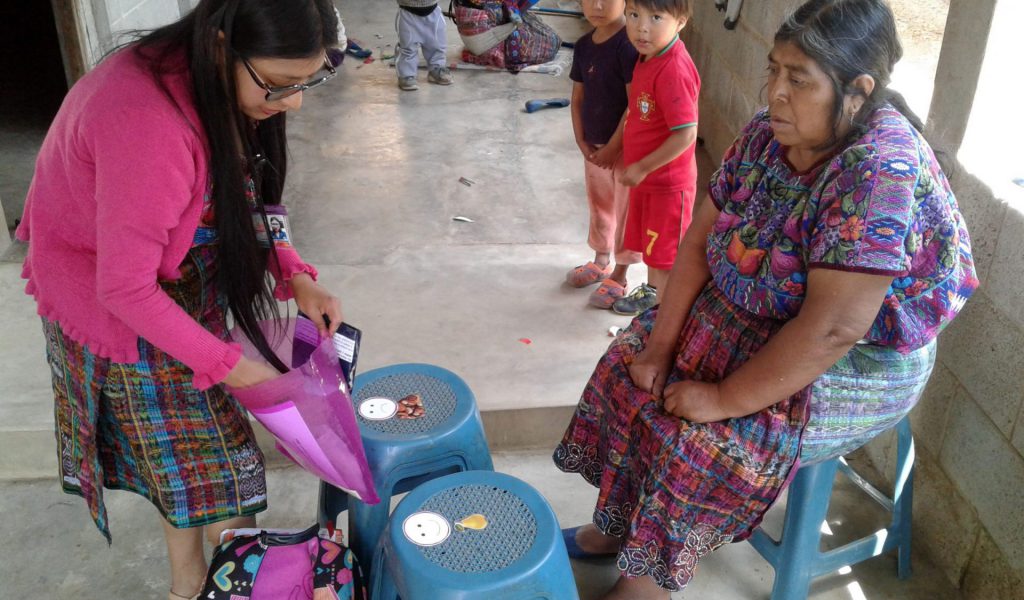
Using an implementation science framework to evaluate the impact of a home-based self management intervention for adults with type 2 diabetes in two health districts in central Guatemala.
FUNDING: World Diabetes Foundation
PUBLICATIONS:
Guarchaj M, Tschida S, Milian Chew JP, Aguilar A, Flood D, Fort MP, Morales LC, Mendoza Montano C, Rodríguez Serrano SN, Rohloff P. Impact of COVID-19 on diabetes care: mixed methods study in an Indigenous area of Guatemala. BMJ Open. 2024 Jan 2;14(1):e079130. doi: 10.1136/bmjopen-2023-079130.
Tschida S, Flood D, Guarchaj M, Milian J, Aguilar A, Fort MP, Guetterman T, Montano CM, Miller A, Morales L, Rohloff P. Implementation of a Diabetes Self-Management Education and Support Intervention in Rural Guatemala: A Mixed-Methods Evaluation Using the RE-AIM Framework. Prev Chronic Dis. 2021 Dec 9;18:E100. doi: 10.5888/pcd18.210259. PMID: 34882536; PMCID: PMC8673946.
Baird C, Rohloff P. Educación Para El Autocuidado de Diabetes Tipo Dos en Guatemala: Una Revision de la Literatura. Wuqu’ Kawoq | Alianza Maya para la Salud: Tecpan, Guatemala; 2019.
PUBLICATIONS:
Guarchaj M, Tschida S, Milian Chew JP, Aguilar A, Flood D, Fort MP, Morales LC, Mendoza Montano C, Rodríguez Serrano SN, Rohloff P. Impact of COVID-19 on diabetes care: mixed methods study in an Indigenous area of Guatemala. BMJ Open. 2024 Jan 2;14(1):e079130. doi: 10.1136/bmjopen-2023-079130.
Tschida S, Flood D, Guarchaj M, Milian J, Aguilar A, Fort MP, Guetterman T, Montano CM, Miller A, Morales L, Rohloff P. Implementation of a Diabetes Self-Management Education and Support Intervention in Rural Guatemala: A Mixed-Methods Evaluation Using the RE-AIM Framework. Prev Chronic Dis. 2021 Dec 9;18:E100. doi: 10.5888/pcd18.210259. PMID: 34882536; PMCID: PMC8673946.
Baird C, Rohloff P. Educación Para El Autocuidado de Diabetes Tipo Dos en Guatemala: Una Revision de la Literatura. Wuqu’ Kawoq | Alianza Maya para la Salud: Tecpan, Guatemala; 2019.
POPULATION-BASED SURVEY OF CHRONIC KIDNEY DISEASE (2018-)
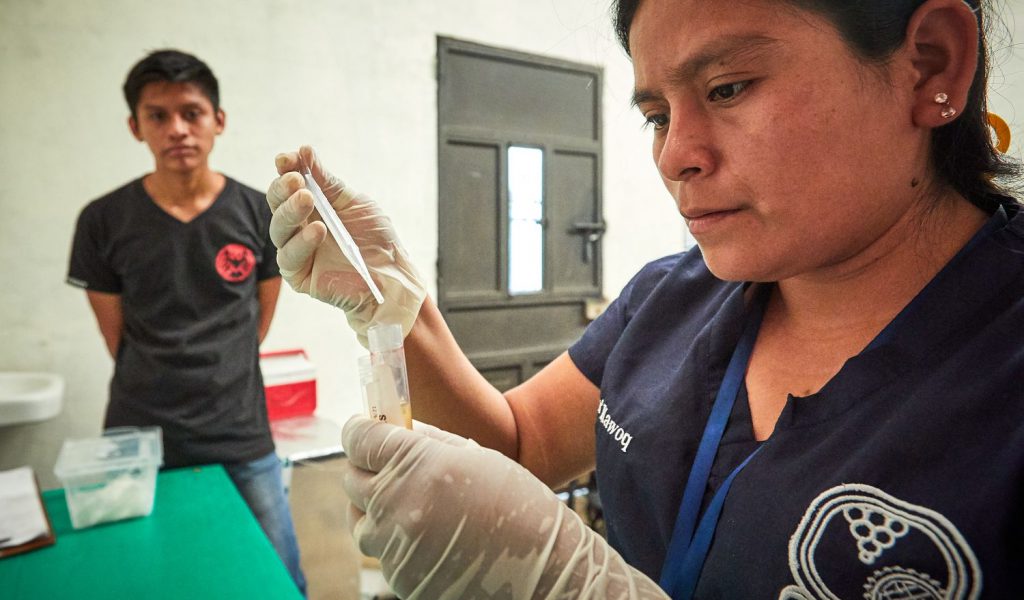
Representative, population-based study surveying prevalence and risk factors for traditional and nontraditional chronic kidney disease in adults in rural Guatemala.
FUNDING: NIH / FIC
PUBLICATIONS:
Steinbrook E, Flood D, Barnoya J, Montano CM, Miller AC, Rohloff P. Prevalence of Hypertension, Diabetes, and Other Cardiovascular Disease Risk Factors in Two Indigenous Municipalities in Rural Guatemala: A Population-Representative Survey. Glob Heart. 2022 Nov 22;17(1):82. doi: 10.5334/gh.1171. PMID: 36578912; PMCID: PMC9695220.
Chary AN, Nandi M, Flood D, Tschida S, Wilcox K, Kurschner S, Garcia P, Rohloff P. Qualitative study of pathways to care among adults with diabetes in rural Guatemala. BMJ Open. 2023 Jan 6;13(1):e056913. doi: 10.1136/bmjopen-2021-056913. PMID: 36609334; PMCID: PMC9827254.
Rohloff P, Miller AC, Barnoya J, Montano CM. Indexing Estimates of GFR to Body Surface Area in Low-Resource Settings With a High Burden of Malnutrition: Evidence From Guatemala. Kidney Int Rep. 2022 Apr 11;7(7):1707-1710. doi: 10.1016/j.ekir.2022.04.007. PMID: 35812277; PMCID: PMC9263247.
Miller AC, Tuiz E, Shaw L, Flood D, Garcia P, Dhaenens E, Thomson DR, Barnoya J, Montano CM, Rohloff P. Population Estimates of GFR and Risk Factors for CKD in Guatemala. Kidney Int Rep. 2021 Jan 1;6(3):796-805. doi: 10.1016/j.ekir.2020.12.015. PMID: 33732994; PMCID: PMC7938058. . Resumen ejecutivo en español
Miller AC, Rohloff P, Blake A, Dhaenens E, Shaw L, Tuiz E, Grandesso F, Mendoza Montano C, Thomson DR. Feasibility of satellite image and GIS sampling for population representative surveys: a case study from rural Guatemala. Int J Health Geogr. 2020 Dec 5;19(1):56. doi: 10.1186/s12942-020-00250-0. PMID: 33278901; PMCID: PMC7718677.
Garcia P, Mendoza C, Barnoya J, Monzon J, Miller AC, Aguilar-Gónzalez A, Boj J, Cifuentes A, Dávila P, Flood D, Guzmán-Quilo C, Hernandez A, Lou-Meda R, Palacios E, Sánchez-Polo V, Sosa R, Rohloff P. CKD care and research in Guatemala: Overview and meeting report. Kidney Int Rep 2020 Jul 2; 5(9):1567-1575.
Nandi M, Kurschner S, Wilcox K, Flood D, Montano CM, Barnoya J, Rohloff P, Chary A. Perceptions of chronic kidney disease among at-risk adults in rural Guatemala. Glob Public Health 2020 Nov 8;1-16.
Flood D, Wilcox K, Ferro AA, Mendoza Montano C, Barnoya J, Garcia P, Lou-Meda R, Rohloff P, Chary A. Challenges in the provision of kidney care at the largest public nephrology center in Guatemala: a qualitative study with health professionals. BMC Nephrol. 2020 Feb 28;21(1):71. doi: 10.1186/s12882-020-01732-w. Informe en español
Wilcox K, Flood D, Aguilar A, Dhaenens E, Garcia P, Miller A, Mendoza C, Lou-Meda R, Rohloff P, Chary A. Provision de servicios de diálisis en Guatemala: un estudio cualitativo.
Flood D, Garcia P, Douglas K, Hawkins J, Rohloff P. Screening for chronic kidney disease in a community-based diabetes cohort in rural Guatemala: a cross-sectional study. BMJ Open 2018 Jan 21:8(1):e019778.
PUBLICATIONS:
Steinbrook E, Flood D, Barnoya J, Montano CM, Miller AC, Rohloff P. Prevalence of Hypertension, Diabetes, and Other Cardiovascular Disease Risk Factors in Two Indigenous Municipalities in Rural Guatemala: A Population-Representative Survey. Glob Heart. 2022 Nov 22;17(1):82. doi: 10.5334/gh.1171. PMID: 36578912; PMCID: PMC9695220.
Chary AN, Nandi M, Flood D, Tschida S, Wilcox K, Kurschner S, Garcia P, Rohloff P. Qualitative study of pathways to care among adults with diabetes in rural Guatemala. BMJ Open. 2023 Jan 6;13(1):e056913. doi: 10.1136/bmjopen-2021-056913. PMID: 36609334; PMCID: PMC9827254.
Rohloff P, Miller AC, Barnoya J, Montano CM. Indexing Estimates of GFR to Body Surface Area in Low-Resource Settings With a High Burden of Malnutrition: Evidence From Guatemala. Kidney Int Rep. 2022 Apr 11;7(7):1707-1710. doi: 10.1016/j.ekir.2022.04.007. PMID: 35812277; PMCID: PMC9263247.
Miller AC, Tuiz E, Shaw L, Flood D, Garcia P, Dhaenens E, Thomson DR, Barnoya J, Montano CM, Rohloff P. Population Estimates of GFR and Risk Factors for CKD in Guatemala. Kidney Int Rep. 2021 Jan 1;6(3):796-805. doi: 10.1016/j.ekir.2020.12.015. PMID: 33732994; PMCID: PMC7938058. . Resumen ejecutivo en español
Miller AC, Rohloff P, Blake A, Dhaenens E, Shaw L, Tuiz E, Grandesso F, Mendoza Montano C, Thomson DR. Feasibility of satellite image and GIS sampling for population representative surveys: a case study from rural Guatemala. Int J Health Geogr. 2020 Dec 5;19(1):56. doi: 10.1186/s12942-020-00250-0. PMID: 33278901; PMCID: PMC7718677.
Garcia P, Mendoza C, Barnoya J, Monzon J, Miller AC, Aguilar-Gónzalez A, Boj J, Cifuentes A, Dávila P, Flood D, Guzmán-Quilo C, Hernandez A, Lou-Meda R, Palacios E, Sánchez-Polo V, Sosa R, Rohloff P. CKD care and research in Guatemala: Overview and meeting report. Kidney Int Rep 2020 Jul 2; 5(9):1567-1575.
Nandi M, Kurschner S, Wilcox K, Flood D, Montano CM, Barnoya J, Rohloff P, Chary A. Perceptions of chronic kidney disease among at-risk adults in rural Guatemala. Glob Public Health 2020 Nov 8;1-16.
Flood D, Wilcox K, Ferro AA, Mendoza Montano C, Barnoya J, Garcia P, Lou-Meda R, Rohloff P, Chary A. Challenges in the provision of kidney care at the largest public nephrology center in Guatemala: a qualitative study with health professionals. BMC Nephrol. 2020 Feb 28;21(1):71. doi: 10.1186/s12882-020-01732-w. Informe en español
Wilcox K, Flood D, Aguilar A, Dhaenens E, Garcia P, Miller A, Mendoza C, Lou-Meda R, Rohloff P, Chary A. Provision de servicios de diálisis en Guatemala: un estudio cualitativo.
Flood D, Garcia P, Douglas K, Hawkins J, Rohloff P. Screening for chronic kidney disease in a community-based diabetes cohort in rural Guatemala: a cross-sectional study. BMJ Open 2018 Jan 21:8(1):e019778.
CARE NAVIGATION TO IMPROVE OBSTETRICAL CARE (2017-2020)
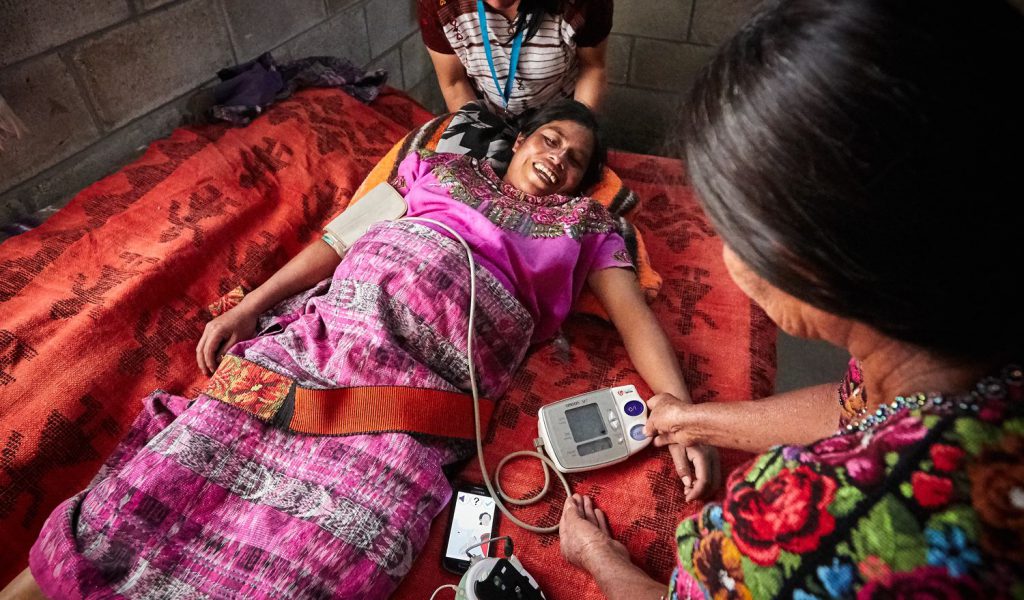
Using a quality improvement framework and care navigation to improve patient satisfaction and emergency obstetrical referral outcomes.
FUNDING: Grand Challenges Canada
PUBLICATIONS:
Austad K, Juarez M, Shryer H, Hibberd PL, Drainoni ML, Rohloff P, Chary A. Improving the experience of facility-based delivery for vulnerable women through obstetric care navigation: a qualitative evaluation. BMC Pregnancy Childbirth. 2021 Jun 11;21(1):425. doi: 10.1186/s12884-021-03842-1.
Juarez, M., Austad, K. and Rohloff, P., 2021. Out-of-Pocket Costs for Facility-Based Obstetrical Care in Rural Guatemala. Annals of Global Health, 87(1), p.75. DOI: http://doi.org/10.5334/aogh.3223
Perry MF, Coyote EI, Austad K, Rohloff P, Why women choose to seek facility-level obstetrical care in rural Guatemala: A qualitative study. Midwifery, Volume 103, 2021, 103097, https://doi.org/10.1016/j.midw.2021.103097
Austad K, Chary A, Hawkins J, Martinez B, Rohloff P. Reconstructing referrals: overcoming barriers to quality obstetric care for Maya women in Guatemala through care navigation. In: Gutschow K, Davis-Floyd R, Daviss B-A, editors. Sustainable Birth in Disruptive Times. Berlin: Springer; 2021. p 171-84.
Austad K, Juarez M, Shryer H, Morataya C, Rohloff P. Obstetric care navigation: results of a quality improvement project to provide accompaniment to women for facility-based maternity care in rural Guatemala. BMJ Qual Saf. 2019 Nov 2. doi: 10.1136/bmjqs-2019-009524.
Juarez M, Austad K, Rohloff P. Lay Midwives: On the Front Lines of the Fight Against Maternal Mortality in Rural Guatemala. Am J Trop Med Hyg. 2019 Feb;100(2):237-238.
Austad K, Chary A, Martinez B, Juarez M, Martin YJ, Ixen EC, Rohloff P. Obstetric care navigation: a new approach to promote respectful maternity care and overcome barriers to safe motherhood. Reprod Health. 2017 Nov 13; 14(1):148.
PUBLICATIONS:
Austad K, Juarez M, Shryer H, Hibberd PL, Drainoni ML, Rohloff P, Chary A. Improving the experience of facility-based delivery for vulnerable women through obstetric care navigation: a qualitative evaluation. BMC Pregnancy Childbirth. 2021 Jun 11;21(1):425. doi: 10.1186/s12884-021-03842-1.
Juarez, M., Austad, K. and Rohloff, P., 2021. Out-of-Pocket Costs for Facility-Based Obstetrical Care in Rural Guatemala. Annals of Global Health, 87(1), p.75. DOI: http://doi.org/10.5334/aogh.3223
Perry MF, Coyote EI, Austad K, Rohloff P, Why women choose to seek facility-level obstetrical care in rural Guatemala: A qualitative study. Midwifery, Volume 103, 2021, 103097, https://doi.org/10.1016/j.midw.2021.103097
Austad K, Chary A, Hawkins J, Martinez B, Rohloff P. Reconstructing referrals: overcoming barriers to quality obstetric care for Maya women in Guatemala through care navigation. In: Gutschow K, Davis-Floyd R, Daviss B-A, editors. Sustainable Birth in Disruptive Times. Berlin: Springer; 2021. p 171-84.
Austad K, Juarez M, Shryer H, Morataya C, Rohloff P. Obstetric care navigation: results of a quality improvement project to provide accompaniment to women for facility-based maternity care in rural Guatemala. BMJ Qual Saf. 2019 Nov 2. doi: 10.1136/bmjqs-2019-009524.
Juarez M, Austad K, Rohloff P. Lay Midwives: On the Front Lines of the Fight Against Maternal Mortality in Rural Guatemala. Am J Trop Med Hyg. 2019 Feb;100(2):237-238.
Austad K, Chary A, Martinez B, Juarez M, Martin YJ, Ixen EC, Rohloff P. Obstetric care navigation: a new approach to promote respectful maternity care and overcome barriers to safe motherhood. Reprod Health. 2017 Nov 13; 14(1):148.
MHEALTH TECHNOLOGY TO SUPPORT OBSTETRICAL CARE (2015-2019)
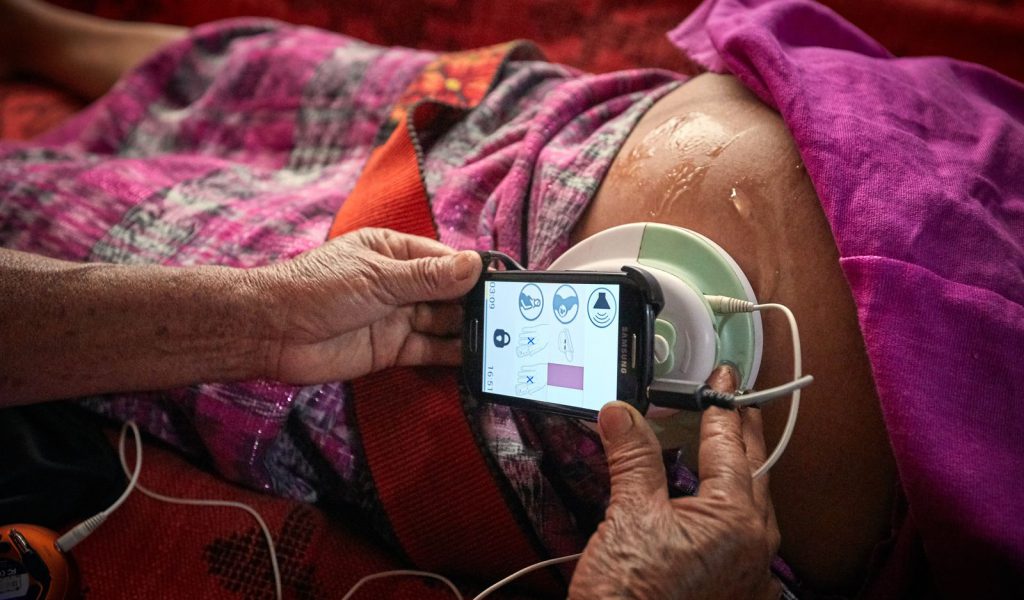
Using smartphones and decision support mHealth applications to support identification and referral of high-risk pregnancies by lay midwives.
FUNDING: NIH / NICHD (PI Gari Clifford, Emory University). Registro: NCT02348849
PUBLICATIONS:
Kulkarni SS, Katebi N, Valderrama CE, Rohloff P, Clifford GD. CNN-Based LCD Transcription of Blood Pressure From a Mobile Phone Camera. Front Artif Intell. 2021 May 21;4:543176. doi: 10.3389/frai.2021.543176. PMID: 34095816; PMCID: PMC8177819.
Valderrama CE, Marzbanrad F, Hall-Clifford R, Rohloff P, Clifford GD. A Proxy for Detecting IUGR Based on Gestational Age Estimation in a Guatemalan Rural Population. Front Artif Intell. 2020 Aug 7;3:56. doi: 10.3389/frai.2020.00056. PMID: 33733173; PMCID: PMC7861337.
Valderrama CE, Marzbanrad F, Juarez M, Hall-Clifford R, Rohloff P, Clifford GD. Estimating birth weight from observed postnatal weights in a Guatemalan highland community. Physiol Meas. 2020 Mar 6;41(2):025008. doi: 10.1088/1361-6579/ab7350.
Valderrama Cuadros CE, Katebi N, Marzbanrad F, Rohloff P, Clifford GD. A review of fetal cardiac monitoring, with a focus on low- and middle-income countries. Physiol Meas 2020 Oct 26. doi.org/10.1088/1361-6579/abc4c7
Valderrama CE, Stroux L, Katebi N, Paljug E, Hall-Clifford R, Rohloff P, Marzbanrad F, Clifford GD. An open source autocorrelation-based method for fetal heart rate estimation from one-dimensional Doppler ultrasound. Physiol Meas. 2019 Feb 26;40(2):025005.
Martinez B, Ixen EC, Hall-Clifford R, Juarez M, Miller AC, Francis A, Valderrama CE, Stroux L, Clifford GD, Rohloff P. mHealth intervention to improve the continuum of maternal and perinatal care in rural Guatemala: a pragmatic, randomized controlled feasibility trial. Reproductive Health 2018;15:120.
Martinez B, Hall-Clifford R, Coyote E, Stroux L, Valderrama CE, Aaron C, Francis A, Hendren C, Rohloff P, Clifford GD. Agile Development of a Smartphone App for Perinatal Monitoring in a Resource-Constrained Setting. J Health Informatics in Dev Countries. 2017; 11:158.
Stroux L, Martinez B, Ixen EC, King N, Hall-Clifford R, Rohloff P, Clifford GD. (2016). An mHealth monitoring system for traditional birth attendant-led antenatal risk assessment in rural Guatemala, Journal of Medical Engineering & Technology.
PUBLICATIONS:
Kulkarni SS, Katebi N, Valderrama CE, Rohloff P, Clifford GD. CNN-Based LCD Transcription of Blood Pressure From a Mobile Phone Camera. Front Artif Intell. 2021 May 21;4:543176. doi: 10.3389/frai.2021.543176. PMID: 34095816; PMCID: PMC8177819.
Valderrama CE, Marzbanrad F, Hall-Clifford R, Rohloff P, Clifford GD. A Proxy for Detecting IUGR Based on Gestational Age Estimation in a Guatemalan Rural Population. Front Artif Intell. 2020 Aug 7;3:56. doi: 10.3389/frai.2020.00056. PMID: 33733173; PMCID: PMC7861337.
Valderrama CE, Marzbanrad F, Juarez M, Hall-Clifford R, Rohloff P, Clifford GD. Estimating birth weight from observed postnatal weights in a Guatemalan highland community. Physiol Meas. 2020 Mar 6;41(2):025008. doi: 10.1088/1361-6579/ab7350.
Valderrama Cuadros CE, Katebi N, Marzbanrad F, Rohloff P, Clifford GD. A review of fetal cardiac monitoring, with a focus on low- and middle-income countries. Physiol Meas 2020 Oct 26. doi.org/10.1088/1361-6579/abc4c7
Valderrama CE, Stroux L, Katebi N, Paljug E, Hall-Clifford R, Rohloff P, Marzbanrad F, Clifford GD. An open source autocorrelation-based method for fetal heart rate estimation from one-dimensional Doppler ultrasound. Physiol Meas. 2019 Feb 26;40(2):025005.
Martinez B, Ixen EC, Hall-Clifford R, Juarez M, Miller AC, Francis A, Valderrama CE, Stroux L, Clifford GD, Rohloff P. mHealth intervention to improve the continuum of maternal and perinatal care in rural Guatemala: a pragmatic, randomized controlled feasibility trial. Reproductive Health 2018;15:120.
Martinez B, Hall-Clifford R, Coyote E, Stroux L, Valderrama CE, Aaron C, Francis A, Hendren C, Rohloff P, Clifford GD. Agile Development of a Smartphone App for Perinatal Monitoring in a Resource-Constrained Setting. J Health Informatics in Dev Countries. 2017; 11:158.
Stroux L, Martinez B, Ixen EC, King N, Hall-Clifford R, Rohloff P, Clifford GD. (2016). An mHealth monitoring system for traditional birth attendant-led antenatal risk assessment in rural Guatemala, Journal of Medical Engineering & Technology.
INDIVIDUALIZED HOME-BASED INTERVENTIONS TO IMPROVE DIET QUALITY AND DEVELOPMENTAL OUTCOMES IN STUNTED CHILDREN (2015-2017)
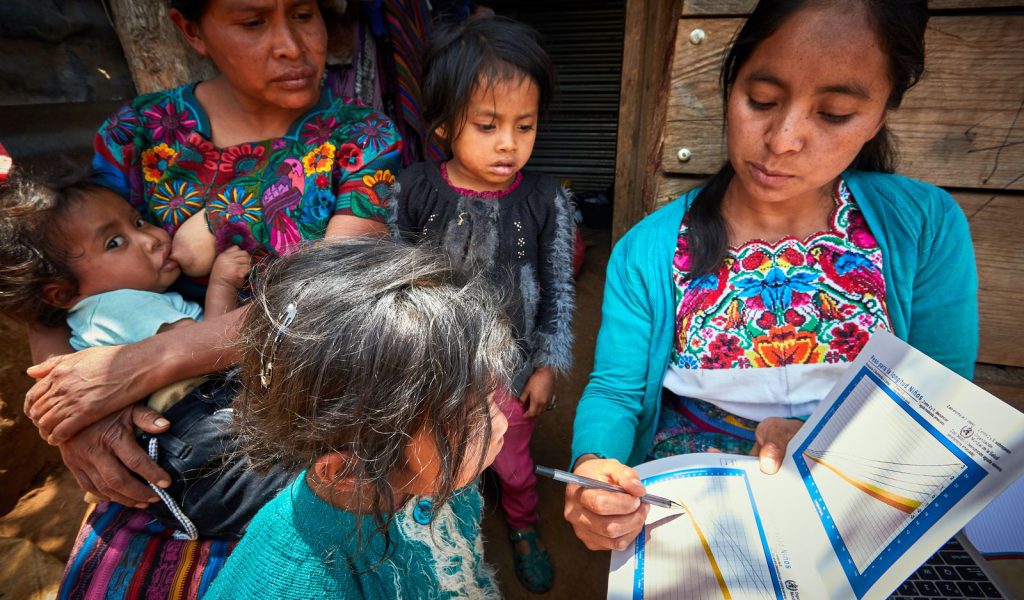
Investigating optimal strategies for empowering caregivers and improving nurturing care for infants at risk.
FUNDING: Grand Challenges Canada. Registro: NCT02509936
PUBLICATIONS:
Webb MF, Martinez B, Rodas P, Gonzalez A, Rohloff P, del Pilar Grazioso M. Language Interpretation in the Administration of Bayley Scales of Infant Development III in an Indigenous Population in Guatemala. WAIMH Perspectives in Infant Mental Health. 2020.
Martinez B, Cardona S, Rodas P, Lubina M, Gonzalez A, Webb MF, Grazioso MdP, Rohloff P. Developmental outcomes of an individualised complementary feeding intervention for stunted children: a substudy from a larger randomised controlled trial in Guatemala. BMJ Paediatrics Open 2018;2:e000314. doi:10.1136/bmjpo-2018-000314
Martinez B, Webb MF, Gonzalez A, Douglas K, Grazioso MdP, Rohloff P. Complementary feeding intervention on stunted Guatemalan children: a randomised controlled trial. BMJ Paediatrics Open 2018;2.
Martinez B, Webb MF, Rodas P, Gonzalez A, del Pilar Grazioso M, Rohloff P. (2016). Field report: Early child development in rural Guatemala. Perspectives in Infant Mental Health. 24(1-2):6-8.
Brown K, Henretty N, Chary A, Webb MF, Wehr H, Moore J, Baird C, Díaz AK, Rohloff P. Mixed-methods study identifies key strategies for improving infant and young child feeding practices in a highly stunted rural indigenous population in Guatemala. Matern Child Nutr. DOI: 10.1111/mcn.12141
PUBLICATIONS:
Webb MF, Martinez B, Rodas P, Gonzalez A, Rohloff P, del Pilar Grazioso M. Language Interpretation in the Administration of Bayley Scales of Infant Development III in an Indigenous Population in Guatemala. WAIMH Perspectives in Infant Mental Health. 2020.
Martinez B, Cardona S, Rodas P, Lubina M, Gonzalez A, Webb MF, Grazioso MdP, Rohloff P. Developmental outcomes of an individualised complementary feeding intervention for stunted children: a substudy from a larger randomised controlled trial in Guatemala. BMJ Paediatrics Open 2018;2:e000314. doi:10.1136/bmjpo-2018-000314
Martinez B, Webb MF, Gonzalez A, Douglas K, Grazioso MdP, Rohloff P. Complementary feeding intervention on stunted Guatemalan children: a randomised controlled trial. BMJ Paediatrics Open 2018;2.
Martinez B, Webb MF, Rodas P, Gonzalez A, del Pilar Grazioso M, Rohloff P. (2016). Field report: Early child development in rural Guatemala. Perspectives in Infant Mental Health. 24(1-2):6-8.
Brown K, Henretty N, Chary A, Webb MF, Wehr H, Moore J, Baird C, Díaz AK, Rohloff P. Mixed-methods study identifies key strategies for improving infant and young child feeding practices in a highly stunted rural indigenous population in Guatemala. Matern Child Nutr. DOI: 10.1111/mcn.12141
Research Team
Researchers at CISI come from diverse backgrounds, but we share an interest in core themes (noncommunicable diseases; chronic malnutrition and food security; child development; gender and health). We also share an interest in certain methodological approaches, especially in mixed methods, applied anthropology, quality improvement and implementation science.
Research Leadership
Andrea Aguilar: medical anthropology
Anita Chary MD PhD: medical anthropology
Meghan Farley Webb PhD: medical anthropology, occupational health
David Flood MD MPH: cardiometabolic diseases, implementation science
Gabriela Montenegro PhD: infant and child nutrition
Peter Rohloff MD PhD: child nutrition and development, noncommunicable diseases, mHealth
Anahí Venzor Strader MD MMSc: neonatal health
Core Research Team
Ana Gabriela Canú Ajqui : Obstetrics
Cindy Villalobos : laboratory science
Laura Morales : Obstetrics, mHealth
Duglas Adonias López García : Early Childhood Development, mHealth
Edlyn Ramos : Obstetrics
Elsa Marina Sebaquijay Iquic : Obstetrics
Elvia Graciela Lares Tepáz : Obstetrics, mHealth
Emily Magali Roxana Serech Cuxil : Obstetrics
Esteban Castro : mHealth, obstetric and neonatal care
Eva Tuiz : Chronic kidney disease, early childhood development
Francisca del Rosario Per Tucubal : Obstetrics, mHealth
Enma Coyote : Obstetrics, mHealth
Irma Yolanda Velasquez Matias : Obstetrics, mHealth
Irma Yolanda Piló Palax : Obstetric care, mHealth
Irma Yolanda Raquec Teleguario : Nutrition, chronic kidney disease
Karen Gabriela Miculax Baján : Obstetrics, mHealth
Karyn Choy : Early childhood development, nutrition
Leslie Yessenia Quino Tian : Obstetrics, mHealth
Lilian Anita Cocon Perez : Obstetrics, mHealth
M. Magdalena Guarchaj Catinac : Diabetes, early childhood development
Manuela Elizabeth Buc Tamat : Obstetrics, mHealth
Mildred Jaqueline Mucia Rucuch : Obstetrics, mHealth
Olga Marina Saloj : Early childhood development, nutrition
Elisa María Reyna Gutiérrez : laboratory science
Rosa Rabinal : early childhood development
Rosibely Sut : Obstetrics, mHealth
Sara Hernández : early childhood development
Scott Tschida : Implementation science
Stephen Alajajian : Diabetes, early childhood development, nutrition
Vilma Yanira Borón Surec : Early childhood development, nutrition
Wendy Rodriguez : Child growth, nutrition, maternal and child health
Rafael Lopez : Chronic kidney disease
Key Collaborators and Affiliating Scientists
Dr. Joaquin Barnoya, Unidad Cardiovascular de Guatemala, Universidad Rafael Landivar. Affiliate Research Scientist at Wuqu’ Kawoq
Dr. Gari Clifford, Department of Biomedical Informatics, Emory University
Dr. Jennifer Crowe, El Instituto Regional de Estudios en Sustancias Tóxicas de la Universidad Nacional de Costa Rica
Dr. Ilgi Ertem, Department of Pediatrics, Ankara University
Dr. Marvin González Quiroz, Department of Renal Medicine, University College London. Affiliate Research Scientist at Wuqu’ Kawoq
Dr. Maria del Pilar Grazioso, Department of Psychology, Universidad del Valle de Guatemala. Proyecto Aigle Guatemala. Affiliate Research Scientist at Wuqu’ Kawoq
Dr. Subodh Gupta, Department of Community Medicine, Mahatma Gandhi Institute of Medical Sciences
MSc Pharm Carol Guzman, Department of Toxicology, Universidad de San Carlos de Guatemala. Affiliate Research Scientist at Wuqu’ Kawoq
Dr. Rachel Hall-Clifford, Department of Sociology, Emory University
Dr. Nasim Katebi, Department of Biomedical Informatics, Emory University. Affiliate Research Scientist at Wuqu’ Kawoq
Dr. Rosa Krajmalnik-Brown, Center for Health through Microbiomes, Arizon State University
Dr. Vibha Krishnamurthy, Ummeed Child Development Center
Dr. Indiana Lopez, Affiliate Research Scientist at Wuqu’ Kawoq
Dr. Ann Miller, Department of Global Health and Social Medicine, Harvard Medical School
Dr. Manuel Ramirez, Centro de Investigación para la Prevención de las Enfermedades Crónicas, Instituto de Nutrición de Centro América y Panamá
Dr. Vicente Sánchez Polo, Universidad de San Carlos de Guatemala. Affiliate Research Scientist at Wuqu’ Kawoq.
Dr. Beth Smith, Department of Pediatrics, University of Southern California, Children’s Hospital Los Angeles
Dr. Alison Steiber, Academy of Nutrition and Dietetics
Dr. Lee Voth-Gaeddert, Center for Health through Microbiomes, Arizona State University. Affiliate Research Scientist at Wuqu’ Kawoq.
Dr. Bradley Wagenaar, Department of Global Health, University of Washington
Dr. Elizabeth Yakes Jimenez, Department of Pediatrics, University of New Mexico
Publications
- Navarrete J, Niño E, Moreno L, Bonilla IL, Gonzalez-Quiroz M. Knowledge, attitudes, and practices of organ, tissue, and cell donation in nicaragua. PLOS Glob Public Health. 2025 Mar 18;5(3):e0004329. doi: 10.1371/journal.pgph.0004329.
- Wellmann IA, Ayala LF, Valley TM, Irazola V, Huffman MD, Heisler M, Rohloff P, Donis R, Palacios E, Ramírez-Zea M, Flood D. Evaluating the World Health Organization's Hearts Model for Hypertension and Diabetes Management: A Pilot Implementation Study in Guatemala. Glob Heart. 2025 Jan 31;20(1):9. doi: 10.5334/gh.1397.
- Tanveer H, Glesener H, Su B, Bolsinger B, Krajmalnik-Brown R, Voth-Gaeddert LE. Evaluating Methods for Aflatoxin B1 Monitoring in Selected Food Crops Within Decentralized Agricultural Systems. Toxins (Basel). 2025 Jan 14;17(1):37. doi: 10.3390/toxins17010037.
- Rutter CE, Njoroge M, Cooper PJ, Prabhakaran D, Jha V, Kaur P, Mohan S, Tatapudi RR, Biggeri A, Rohloff P, Hathaway MH, Crampin AC, Dhimal M, Poudyal A, Bernabe-Ortiz A, O'Callaghan-Gordo C, Chulasiri P, Gunawardena N, Ruwanpathirana T, Wickramasinghe SC, Senanayake S, Kitiyakara C, Gonzalez-Quiroz M, Cortés S, Jakobsson K, Correa-Rotter R, Glaser J, Singh A, Hamilton S, Nair D, Aragón A, Nitsch D, Robertson S, Caplin B, Pearce N; DEGREE Study Group. International prevalence patterns of low eGFR in adults aged 18-60 without traditional risk factors from a population-based cross-sectional disadvantaged populations eGFR epidemiology (DEGREE) study. Kidney Int. 2025 Mar;107(3):541-557. doi: 10.1016/j.kint.2024.11.028.
- Montenegro-Benthancourt G, Glesener H, Torres O, Seegmiller E, Rohloff P, Voth-Gaeddert LE. Practices of maize handling and nixtamalization to reduce fungal toxin exposure in rural Guatemala. J Agric Food Res. 2024 Dec;18:101512. doi: 10.1016/j.jafr.2024.101512. Epub 2024 Nov 12.
- Oh J, Ordoñez ELT, Velasquez E, Mejía M, Del Pilar Grazioso M, Rohloff P, Smith BA. Associating neuromotor outcomes at 12 months with wearable sensor measures collected during early infancy in rural Guatemala. Gait Posture. 2024 Sep;113:477-489. doi: 10.1016/j.gaitpost.2024.08.005. Epub 2024 Aug 8.
- Glesener H, Abdollahzadeh D, Muse C, Krajmalnik-Brown R, Weaver MA, Voth-Gaeddert LE. X-ray Irradiation Reduces Live Aspergillus flavus Viability but Not Aflatoxin B1 in Naturally Contaminated Maize. Toxins (Basel). 2024 Jul 25;16(8):329. doi: 10.3390/toxins16080329.
- Ramos E, Piló Palax I, Serech Cuxil E, Sebaquijay Iquic E, Canú Ajqui A, Miller AC, Chandrasekeran S, Hall-Clifford R, Sameni R, Katebi N, Clifford GD, Rohloff P. Mobil Monitoring Doppler Ultrasound (MoMDUS) study: protocol for a prospective, observational study investigating the use of artificial intelligence and low-cost Doppler ultrasound for the automated quantification of hypertension, pre-eclampsia and fetal growth restriction in rural Guatemala. BMJ Open. 2024 Sep 10;14(9):e090503. doi: 10.1136/bmjopen-2024-090503.
- Flom P, Harron K, Ballesteros J, Kalinda C, Koutoumanou E, Miles J, Nevitt SJ, Rohloff P. Common errors in statistics and methods. BMJ Paediatr Open. 2024 Sep 15;8(1):e002755. doi: 10.1136/bmjpo-2024-002755. PMID: 39284617; PMCID: PMC11409338.
- Katebi N, Bremer W, Nguyen T, Phan D, Jeff J, Armstrong K, Phabian-Millbrook P, Platner M, Carroll K, Shoai B, Rohloff P, Boulet SL, Franklin CG, Clifford GD. Automated image transcription for perinatal blood pressure monitoring using mobile health technology. PLOS Digit Health. 2024 Oct 2;3(10):e0000588. doi: 10.1371/journal.pdig.0000588.
- Bandal A, Hernández S, Mustafa R, Choy K, Edwards N, Guarchaj M, Mejía Alvarez M, Sane A, Tschida S, Maliye C, Miller A, Raut A, Srinivasan R, Turner M, Wagenaar BH, Ertem I, Grazioso MDP, Gupta SS, Krishnamurthy V, Rohloff P. Methodology for adapting a co-created early childhood development intervention and implementation strategies for use by frontline workers in India and Guatemala: a systematic application of the FRAME-IS framework. Glob Health Action. 2024 Dec 31;17(1):2338324. doi: 10.1080/16549716.2024.2338324. Epub 2024 May 10. PMID: 38726569; PMCID: PMC11089920.
- Oh J, Ordoñez ELT, Velasquez E, Mejía M, Grazioso MDP, Rohloff P, Smith BA. Early full-day leg movement kinematics and swaddling patterns in infants in rural Guatemala: A pilot study. PLoS One. 2024 Feb 29;19(2):e0298652.
- Venzor Strader A, Sotz M, Gilbert HN, Miller AC, Lee AC, Rohloff P. A biosocial analysis of perinatal and late neonatal mortality among Indigenous Maya Kaqchikel communities in Tecpán, Guatemala: a mixed-methods study. BMJ Glob Health. 2024 Apr 17;9(4):e013940. doi: 10.1136/bmjgh-2023-013940. PMID: 38631704; PMCID: PMC11029291.
- Yoo SGK, Chung GS, Bahendeka SK, Sibai AM, Damasceno A, Farzadfar F, Rohloff P, Houehanou C, Norov B, Karki KB, Azangou-Khyavy M, Marcus ME, Aryal KK, Brant LCC, Theilmann M, Cífková R, Lunet N, Gurung MS, Mwangi JK, Martins J, Haghshenas R, Sturua L, Vollmer S, Bärnighausen T, Atun R, Sussman JB, Singh K, Moghaddam SS, Guwatudde D, Geldsetzer P, Manne-Goehler J, Huffman MD, Davies JI, Flood D. Global Prevalence of Aspirin Use for Primary Prevention of Cardiovascular Disease: A Cross-Sectional Study of Nationally Representative, Individual-Level Data. Glob Heart. 2024 May 3;19(1):44.
- Rohloff P, Gupta S, López Canu W, Rodríguez Gómez W, Sridhar S, Venzor A. New WHO guideline on the prevention and management of acute malnutrition in infants and young children: remaining challenges. BMJ Paediatr Open. 2024 May 7;8(1):e002471. doi: 10.1136/bmjpo-2023-002471. PMID: 38719564; PMCID: PMC11086452.
- Stein DT, Reitsma MB, Geldsetzer P, Agoudavi K, Aryal KK, Bahendeka S, Brant LCC, Farzadfar F, Gurung MS, Guwatudde D, Houehanou YCN, Malta DC, Martins JS, Saeedi Moghaddam S, Mwangi KJ, Norov B, Sturua L, Zhumadilov Z, Bärnighausen T, Davies JI, Flood D, Marcus ME, Theilmann M, Vollmer S, Manne-Goehler J, Atun R, Sudharsanan N, Verguet S. Hypertension care cascades and reducing inequities in cardiovascular disease in low- and middle-income countries. Nat Med. 2024 Feb;30(2):414-423. doi: 10.1038/s41591-023-02769-8. Epub 2024 Jan 26. PMID: 38278990.
- Miller AC, Flood D, Tschida S, Douglas K, Rohloff P. Assessing child development scores among minority and Indigenous language versus dominant language speakers: a cross-sectional analysis of national Multiple Indicator Cluster Surveys. Lancet Glob Health. 2024 Jan;12(1):e90-e99. doi: 10.1016/S2214-109X(23)00456-4. Epub 2023 Nov 10. PMID: 37956682.
- Wellmann IA, Ayala LF, Rodríguez JJ, Guetterman TC, Irazola V, Palacios E, Huffman MD, Rohloff P, Heisler M, Ramírez-Zea M, Flood D. Implementing integrated hypertension and diabetes management using the World Health Organization's HEARTS model: protocol for a pilot study in the Guatemalan national primary care system. Implement Sci Commun. 2024 Jan 9;5(1):7. doi: 10.1186/s43058-023-00539-8.
- Guarchaj M, Tschida S, Milian Chew JP, Aguilar A, Flood D, Fort MP, Morales LC, Mendoza Montano C, Rodríguez Serrano SN, Rohloff P. Impact of COVID-19 on diabetes care: mixed methods study in an Indigenous area of Guatemala. BMJ Open. 2024 Jan 2;14(1):e079130. doi: 10.1136/bmjopen-2023-079130.
- Ware L, Vermeulen B, Maposa I, Flood D, Brant LCC, Khandelwal S, Singh K, Soares S, Jessen N, Perman G, Riaz BK, Sachdev HS, Allen NB, Labarthe DR. Comparison of Cardiovascular Health Profiles Across Population Surveys From 5 High- to Low-Income Countries. CJC Open. 2023 Dec 4;6(3):582-596.
- Strasma A, Reyes ÁM, Aragón A, López I, Park LP, Hogan SL, Thielman N, Wyatt C, González-Quiroz M. Kidney disease characteristics, prevalence, and risk factors in León, Nicaragua: a population-based study. BMC Nephrol. 2023 Nov 12;24(1):335. doi: 10.1186/s12882-023-03381-1. PMID: 37953252; PMCID: PMC10641961.
- Gonzalez-Quiroz M, Heggeseth B, Camacho A, Oomatia A, Al-Rashed AM, Zhang Y, McCreight A, Jewell N, Aragon A, Nitsch D, Pearce N, Caplin B. Population-level detection of early loss of kidney function: 7-year follow-up of a young adult cohort at risk of Mesoamerican nephropathy. Int J Epidemiol. 2024 Feb 1;53(1):dyad151. doi: 10.1093/ije/dyad151. Erratum in: Int J Epidemiol. 2023 Nov 29;: PMID: 37930052; PMCID: PMC10859140.
- NCD Risk Factor Collaboration (NCD-RisC). Global variation in diabetes diagnosis and prevalence based on fasting glucose and hemoglobin A1c. Nat Med. 2023 Nov;29(11):2885-2901. doi: 10.1038/s41591-023-02610-2. Epub 2023 Nov 9. PMID: 37946056; PMCID: PMC10667106.
- Asturias G, Cordón A, Pineda E, Figueroa Z, V. Proaño G, Yakes Jimenez E, Rohlff P. Short Report: Mapping Nutrition Interventions in Guatemala To Identify Opportunities
- Yoo SGK, Chung GS, Bahendeka SK, et al. Aspirin for Secondary Prevention of Cardiovascular Disease in 51 Low-, Middle-, and High-Income Countries. 2023;330(8):715–724. doi:10.1001/jama.2023.12905
- de la Garza Iga FJ, Mejía Alvarez M, Cockroft JD, et al. Using the project ECHOTM model to teach mental health topics in rural Guatemala: An implementation science-guided evaluation. International Journal of Social Psychiatry. 2023;0(0). doi:10.1177/00207640231188038
- Skinner NA, Sanders K, Lopez E, Sotz Mux MS, Abascal Miguel L, Vosburg KB, Johnston J, Diamond-Smith N, Kraemer Diaz A. Barriers to COVID-19 vaccine acceptance to improve messages for vaccine uptake in indigenous populations in the central highlands of Guatemala: a participatory qualitative study. BMJ Open. 2023 Jan 27;13(1):e067210. doi: 10.1136/bmjopen-2022-067210. PMID: 36707110; PMCID: PMC9884572.
- Chary AN, Nandi M, Flood D, Tschida S, Wilcox K, Kurschner S, Garcia P, Rohloff P. Qualitative study of pathways to care among adults with diabetes in rural Guatemala. BMJ Open. 2023 Jan 6;13(1):e056913. doi: 10.1136/bmjopen-2021-056913. PMID: 36609334; PMCID: PMC9827254.
- Rohloff P, Flood D, Tuiz E, Kurschner S, Nandi M, Tschida S, Wilcox K, Chary A. Adults' experiences with type 2 diabetes in rural Guatemala: a qualitative study. J Health Care Poor Underserved. 2023;34(1):208-223.
- Katebi N, Sameni R, Rohloff P, Clifford GD. Hierarchical Attentive Network for Gestational Age Estimation in Low-Resource Settings. IEEE J Biomed Health Inform. 2023 May;27(5):2501-2511.
- Cheng Q, Glesener H, Montenegro G, Torres O, Miller AC, Krajmalnik-Brown R, Rohloff P, Voth-Gaeddert LE. Assessment of aflatoxin exposure, growth faltering and the gut microbiome among children in rural Guatemala: protocol for an observational prospective cohort and bioreactor simulations. BMJ Paediatr Open. 2023 Apr;7(1):e001960.
- NCD Risk Factor Collaboration (NCD-RisC). Diminishing benefits of urban living for children and adolescents' growth and development. Nature. 2023 Mar;615(7954):874-883. doi: 10.1038/s41586-023-05772-8. Epub 2023 Mar 29.
- Wallace TC, Montenegro-Bethancourt G, Rohloff P, Jimenez EY, Proaño GV, McCabe GP, Steiber A, Ruosch A, Laessig I, Ladwig E, You H. Comparison of the nutrient composition of eggs produced in the Guatemalan highlands during the wet and dry seasons. Food Sci Nutr. 2023 Oct 13;11(12):8163-8173. doi: 10.1002/fsn3.3736.
- Choonara I, Escobedo AA, Olusanya BO, Raj M, Rohloff P, Zeng L, Zhao W. BMJ Paediatrics Open and the Global South: an open call towards editorial diversity and inclusion. BMJ Paediatr Open. 2022 Oct;6(1):e001679. doi: 10.1136/bmjpo-2022-001679. PMID: 36645794; PMCID: PMC9621182.
- Flood D, Brant LCC, Sussman JB. The triglyceride glucose index and cardiovascular disease outcomes. Lancet Healthy Longev. 2023 Jan;4(1):e2-e3. doi: 10.1016/S2666-7568(22)00269-0. Epub 2022 Dec 12. PMID: 36521499.
- Chary A, Hawkins J, Flood D, Martinez B, Colom M, Austad K. Medical students' experiences of compulsory rural service in Guatemala: a qualitative study. Rural Remote Health. 2022 May;22(2):6582. doi: 10.22605/RRH6582. Epub 2022 May 26. PMID: 35617739.
- Steinbrook E, Flood D, Barnoya J, Montano CM, Miller AC, Rohloff P. Prevalence of Hypertension, Diabetes, and Other Cardiovascular Disease Risk Factors in Two Indigenous Municipalities in Rural Guatemala: A Population-Representative Survey. Glob Heart. 2022 Nov 22;17(1):82. doi: 10.5334/gh.1171. PMID: 36578912; PMCID: PMC9695220.
- Rohloff P, Miller AC, Barnoya J, Montano CM. Indexing Estimates of GFR to Body Surface Area in Low-Resource Settings With a High Burden of Malnutrition: Evidence From Guatemala. Kidney Int Rep. 2022 Apr 11;7(7):1707-1710. doi: 10.1016/j.ekir.2022.04.007. PMID: 35812277; PMCID: PMC9263247.
- Abascal Miguel L, Lopez E, Sanders K, Skinner NA, Johnston J, Vosburg KB, Kraemer Diaz A, Diamond-Smith N. Evaluating the impact of a linguistically and culturally tailored social media ad campaign on COVID-19 vaccine uptake among indigenous populations in Guatemala: a pre/post design intervention study. BMJ Open. 2022 Dec 13;12(12):e066365. doi: 10.1136/bmjopen-2022-066365. PMID: 36523220; PMCID: PMC9748511.
- Flood D, Geldsetzer P, Agoudavi K, Aryal KK, Brant LCC, Brian G, Dorobantu M, Farzadfar F, Gheorghe-Fronea O, Gurung MS, Guwatudde D, Houehanou C, Jorgensen JMA, Kondal D, Labadarios D, Marcus ME, Mayige M, Moghimi M, Norov B, Perman G, Quesnel-Crooks S, Rashidi MM, Moghaddam SS, Seiglie JA, Bahendeka SK, Steinbrook E, Theilmann M, Ware LJ, Vollmer S, Atun R, Davies JI, Ali MK, Rohloff P, Manne-Goehler J. Rural-Urban Differences in Diabetes Care and Control in 42 Low- and Middle-Income Countries: A Cross-sectional Study of Nationally Representative Individual-Level Data. Diabetes Care. 2022 Sep 1;45(9):1961-1970. doi: 10.2337/dc21-2342. PMID: 35771765; PMCID: PMC9472489.
- Bonilla K, Romero-Oliva C, Arrechea S, Ortiz N, Mazariegos F, Alonzo M, Orellana-Corrales G, del Valle A, Montenegro-Bethancour G. Engaging the Guatemala Scientific Diaspora: The Power of Networking and Shared Learning Front. Res. Metr. Anal. 7:897670. doi: 10.3389/frma.2022.897670.
- Alajajian S, Guzman-Abril A, Proaño GV, Jimenez EY, Rohloff P. Mixed-methods implementation study of a home garden intervention in rural Guatemala using the RE-AIM framework. J Acad Nutr Diet. 2022 Mar 8:S2212-2672(22)00134-4. doi: 10.1016/j.jand.2022.03.005. Epub ahead of print. PMID: 35276414.
- Marcus ME, Manne-Goehler J, Theilmann M, Farzadfar F, Moghaddam SS, Keykhaei M, Hajebi A, Tschida S, Lemp JM, Aryal KK, Dunn M, Houehanou C, Bahendeka S, Rohloff P, Atun R, Bärnighausen TW, Geldsetzer P, Ramirez-Zea M, Chopra V, Heisler M, Davies JI, Huffman MD, Vollmer S, Flood D. Use of statins for the prevention of cardiovascular disease in 41 low-income and middle-income countries: a cross-sectional study of nationally representative, individual-level data. Lancet Glob Health. 2022 Mar;10(3):e369-e379. doi: 10.1016/S2214-109X(21)00551-9. PMID: 35180420; PMCID: PMC8896912.
- Garcia A, Juarez M, Sacuj N, Tzurec E, Larson K, Miller A, Rohloff P. Loss to Follow-Up and the Care Cascade for Cervical Cancer Care in Rural Guatemala: A Cross-Sectional Study. JCO Glob Oncol. 2022 Feb;8:e2100286. doi: 10.1200/GO.21.00286. PMID: 35113733; PMCID: PMC8853617.
- Flood D, Guwatudde D, Damasceno A, Manne-Goehler J, Davies JI; Global Health and Population Project on Access to Care for Cardiometabolic Diseases (HPACC). Maximising use of population data on cardiometabolic diseases. Lancet Diabetes Endocrinol. 2022 Mar;10(3):154-157. doi: 10.1016/S2213-8587(21)00328-4. Epub 2022 Jan 10. PMID: 35026159.
- Ballard M, Westgate C, Alban R, Choudhury N, Adamjee R, Schwarz R, Bishop J, McLaughlin M, Flood D, Finnegan K, Rogers A, Olsen H, Johnson A, Palazuelos D, Schechter J. Compensation models for community health workers: Comparison of legal frameworks across five countries. J Glob Health. 2021 Feb 15;11:04010. doi: 10.7189/jogh.11.04010. PMID: 33692894; PMCID: PMC7916445.
- Basu S, Flood D, Geldsetzer P, Theilmann M, Marcus ME, Ebert C, Mayige M, Wong-McClure R, Farzadfar F, Saeedi Moghaddam S, Agoudavi K, Norov B, Houehanou C, Andall-Brereton G, Gurung M, Brian G, Bovet P, Martins J, Atun R, Bärnighausen T, Vollmer S, Manne-Goehler J, Davies J. Estimated effect of increased diagnosis, treatment, and control of diabetes and its associated cardiovascular risk factors among low-income and middle-income countries: a microsimulation model. Lancet Glob Health. 2021 Nov;9(11):e1539-e1552. doi: 10.1016/S2214-109X(21)00340-5. Epub 2021 Sep 22. Erratum in: Lancet Glob Health. 2022 Feb;10(2):e185. PMID: 34562369; PMCID: PMC8526364.
- Mactaggart I, Hasan Bek A, Banks LM, Bright T, Dionicio C, Hameed S, Neupane S, Murthy G, Orucu A, Oye J, Naber J, Shakespeare T, Patterson A, Polack S, Kuper H. Interrogating and Reflecting on Disability Prevalence Data Collected Using the Washington Group Tools: Results from Population-Based Surveys in Cameroon, Guatemala, India, Maldives, Nepal, Turkey and Vanuatu. Int J Environ Res Public Health. 2021 Aug 31;18(17):9213. doi: 10.3390/ijerph18179213. PMID: 34501803; PMCID: PMC8431177.
- Tschida S, Flood D, Guarchaj M, Milian J, Aguilar A, Fort MP, Guetterman T, Montano CM, Miller A, Morales L, Rohloff P. Implementation of a Diabetes Self-Management Education and Support Intervention in Rural Guatemala: A Mixed-Methods Evaluation Using the RE-AIM Framework. Prev Chronic Dis. 2021 Dec 9;18:E100. doi: 10.5888/pcd18.210259. PMID: 34882536; PMCID: PMC8673946.
- Tschida S, Cordon A, Asturias G, Mazariegos M, Kroker-Lobos MF, Jackson B, Rohloff P, Flood D. Projecting the Impact of Nutrition Policy to Improve Child Stunting: A Case Study in Guatemala Using the Lives Saved Tool. Glob Health Sci Pract. 2021 Dec 21;9(4):752-764. doi: 10.9745/GHSP-D-20-00585. PMID: 34933973; PMCID: PMC8691882.
- Flood D, Seiglie JA, Dunn M, Tschida S, Theilmann M, Marcus ME, Brian G, Norov B, Mayige MT, Singh Gurung M, Aryal KK, Labadarios D, Dorobantu M, Silver BK, Bovet P, Adelin Jorgensen JM, Guwatudde D, Houehanou C, Andall-Brereton G, Quesnel-Crooks S, Sturua L, Farzadfar F, Saeedi Moghaddam S, Atun R, Vollmer S, Bärnighausen TW, Davies JI, Wexler DJ, Geldsetzer P, Rohloff P, Ramírez-Zea M, Heisler M, Manne-Goehler J. The state of diabetes treatment coverage in 55 low-income and middle-income countries: a cross-sectional study of nationally representative, individual-level data in 680 102 adults. Lancet Healthy Longev. 2021 Jun;2(6):e340-e351. doi: 10.1016/s2666-7568(21)00089-1. Epub 2021 May 21. PMID: 35211689; PMCID: PMC8865379.
- Raut A, Mustafayev R, Srinivasan R, Chary A, Ertem I, Grazioso MDP, Gupta S, Krishnamurthy V, Lu C, Maliye C, Miller AC, Wagenaar BH, Rohloff P. Hybrid type 1 effectiveness/implementation trial of the international Guide for Monitoring Child Development: protocol for a cluster-randomised controlled trial. BMJ Paediatr Open. 2021 Sep 15;5(1):e001254. doi: 10.1136/bmjpo-2021-001254. PMID: 34604546; PMCID: PMC8444252.
- Wallace TC, Rohloff P, Jimenez EY, Proaño GV, Montenegro-Bethancourt G, McCabe GP, Steiber A. Academy of Nutrition and Dietetics Nutrition Research Network: The Saqmolo' Project Rationale and Study Protocol for a Randomized Controlled Trial Examining the Influence of Daily Complementary Feeding of Eggs on Infant Development and Growth in Guatemala. J Acad Nutr Diet. 2021 May 4:S2212-2672(21)00226-4. doi: 10.1016/j.jand.2021.03.015. Epub ahead of print. PMID: 33962902.
- Kulkarni SS, Katebi N, Valderrama CE, Rohloff P, Clifford GD. CNN-Based LCD Transcription of Blood Pressure From a Mobile Phone Camera. Front Artif Intell. 2021 May 21;4:543176. doi: 10.3389/frai.2021.543176. PMID: 34095816; PMCID: PMC8177819.
- Austad K, Juarez M, Shryer H, Hibberd PL, Drainoni ML, Rohloff P, Chary A. Improving the experience of facility-based delivery for vulnerable women through obstetric care navigation: a qualitative evaluation. BMC Pregnancy Childbirth. 2021 Jun 11;21(1):425. doi: 10.1186/s12884-021-03842-1. PMID: 34116648; PMCID: PMC8193958.
- Miller AC, Tuiz E, Shaw L, Flood D, Garcia P, Dhaenens E, Thomson DR, Barnoya J, Montano CM, Rohloff P. Population Estimates of GFR and Risk Factors for CKD in Guatemala. Kidney Int Rep. 2021 Jan 1;6(3):796-805. doi: 10.1016/j.ekir.2020.12.015. PMID: 33732994; PMCID: PMC7938058. . Resumen ejecutivo en español
- Rosales MR, Rohloff P, Vanderbilt DL, Tripathi T, Valentini NC, Dusing S, Smith BA. Collecting Infant Environmental and Experiential Data Using Smartphone Surveys. Pediatr Phys Ther. 2021 Jan 01; 33(1):47-49.
- Juarez M, Dionicio C, Sacuj N, Lopez W, Miller AC, Rohloff P. Community-Based Interventions to Reduce Child Stunting in Rural Guatemala: A Quality Improvement Model. International Journal of Environmental Research and Public Health. 2021; 18(2):773.
- Rohloff, P. On the frontlines of chronic paediatric undernutrition in Guatemala. EBioMedicine.Volume 64, 103223, February 1, 2021.
- Chacón, V., Liu, Q., Park, Y., Rohloff, P. and Barnoya, J. (2021), Diet quality, school attendance, and body weight status in adolescent girls in rural Guatemala. Ann. N.Y. Acad. Sci. https://nyaspubs.onlinelibrary.wiley.com/doi/10.1111/nyas.14558
- Guzmán-Abril A, Alajajian S, Rohloff P, Proaño GV, Brewer J, Jimenez EY. Academy of Nutrition and Dietetics Nutrition Research Network: A Home Garden Intervention Improves Child Length-for-Age Z-Score and Household-Level Crop Count and Nutritional Functional Diversity in Rural Guatemala. J Acad Nutr Diet. 2021 May 18:S2212-2672(21)00230-6. doi: 10.1016/j.jand.2021.04.002. Epub ahead of print. PMID: 34020932.
- Juarez, M., Austad, K. and Rohloff, P., 2021. Out-of-Pocket Costs for Facility-Based Obstetrical Care in Rural Guatemala. Annals of Global Health, 87(1), p.75. DOI: http://doi.org/10.5334/aogh.3223
- Perry MF, Coyote EI, Austad K, Rohloff P, Why women choose to seek facility-level obstetrical care in rural Guatemala: A qualitative study. Midwifery, Volume 103, 2021, 103097, ISSN 0266-6138, https://doi.org/10.1016/j.midw.2021.103097
- Austad K, Chary A, Hawkins J, Martinez B, Rohloff P. Reconstructing referrals: overcoming barriers to quality obstetric care for Maya women in Guatemala through care navigation. In: Gutschow K, Davis-Floyd R, Daviss B-A, editors. Sustainable Birth in Disruptive Times. Berlin: Springer; 2021. p 171-84.
- Chary A, Rohloff P. Medical “Errands” among Women with Cervical Cancer in Guatemala. In: Olsen WC, Sargent C, editors. The Work of Hospitals. New Brunswick: Rutgers University Press; 2021. p 119-31.
- Fischer SE, Patil P, Zielinski C, Baxter L, Bonilla-Escobar FJ, Hussain S, Lai C, Walpole SC, Ohanyido F, Flood D, Singh A, Al-Shorbaji N. Is it about the ‘where’ or the ‘how’? Comment on Defining global health as public health somewhere else. BMJ Glob Health. 2020 May;5(5):e002567. doi: 10.1136/bmjgh-2020-002567. PMID: 32381654; PMCID: PMC7223010.
- Ballard M, Bancroft E, Nesbit J, Johnson A, Holeman I, Foth J, Rogers D, Yang J, Nardella J, Olsen H, Raghavan M, Panjabi R, Alban R, Malaba S, Christiansen M, Rapp S, Schechter J, Aylward P, Rogers A, Sebisaho J, Ako C, Choudhury N, Westgate C, Mbeya J, Schwarz R, Bonds MH, Adamjee R, Bishop J, Yembrick A, Flood D, McLaughlin M, Palazuelos D. Prioritising the role of community health workers in the COVID-19 response. BMJ Glob Health. 2020 Jun;5(6):e002550. doi: 10.1136/bmjgh-2020-002550. PMID: 32503889; PMCID: PMC7298684.
- Miller AC, Rohloff P, Blake A, Dhaenens E, Shaw L, Tuiz E, Grandesso F, Mendoza Montano C, Thomson DR. Feasibility of satellite image and GIS sampling for population representative surveys: a case study from rural Guatemala. Int J Health Geogr. 2020 Dec 5;19(1):56. doi: 10.1186/s12942-020-00250-0. PMID: 33278901; PMCID: PMC7718677.
- Valderrama CE, Marzbanrad F, Hall-Clifford R, Rohloff P, Clifford GD. A Proxy for Detecting IUGR Based on Gestational Age Estimation in a Guatemalan Rural Population. Front Artif Intell. 2020 Aug 7;3:56. doi: 10.3389/frai.2020.00056. PMID: 33733173; PMCID: PMC7861337.
- Webb M, Cuj M. Guatemala’s Public Health Messaging in Mayan Languages during the COVID-19 Pandemic. J Indigenous Social Development 2020; 9(3):102-109.
- Miller AC, Tuiz E, Shaw L, Flood D, Garcia P, Dhaenens E, Thomson D, Barnoya J, Mendoza Montano C, Rohloff P. Population estimates of Glomerular Filtration Rate and Risk Factors for Chronic Kidney Disease in Guatemala. Kidney International Reports. December 31, 2020. DOI:https://doi.org/10.1016/j.ekir.2020.12.015
- Flood D, Hane J, Dunn M, Brown SJ, Wagenaar BH, Rogers EA, Heisler M, Rohloff P, Chopra V. Health system interventions for adults with type 2 diabetes in low- and middle-income countries: A systematic review and meta-analysis. PLoS Med 2020 Nov 12;17(11):e1003434
- Garcia P, Mendoza C, Barnoya J, Monzon J, Miller AC, Aguilar-Gónzalez A, Boj J, Cifuentes A, Dávila P, Flood D, Guzmán-Quilo C, Hernandez A, Lou-Meda R, Palacios E, Sánchez-Polo V, Sosa R, Rohloff P. CKD care and research in Guatemala: Overview and meeting report. Kidney Int Rep 2020 Jul 2; 5(9):1567-1575.
- Nandi M, Kurschner S, Wilcox K, Flood D, Montano CM, Barnoya J, Rohloff P, Chary A. Perceptions of chronic kidney disease among at-risk adults in rural Guatemala. Glob Public Health 2020 Nov 8;1-16.
- Valderrama Cuadros CE, Katebi N, Marzbanrad F, Rohloff P, Clifford GD. A review of fetal cardiac monitoring, with a focus on low- and middle-income countries. Physiol Meas 2020 Oct 26. doi.org/10.1088/1361-6579/abc4c7
- Webb MF, Martinez B, Rodas P, Gonzalez A, Rohloff P, del Pilar Grazioso M. Language Interpretation in the Administration of Bayley Scales of Infant Development III in an Indigenous Population in Guatemala. WAIMH Perspectives in Infant Mental Health. 2020. Epub 15 May 2020.
- Alajajian S, Guzmán-Abril AP, Brewer J, Rohloff P. Patrones alimentarios y agrícolas de hogares con niños desnutridos en dos comunidades indígenas con distinto nivel socioeconómico en Guatemala. Estudios Sociales 2020; 30:55
- Garcia A, Nandi M, Mux S, Chary A, Austad K. Contraception during COVID-19: experiences from rural, indigenous communities in Guatemala. Med Anthrol Quarterly, June 19, 2020.
- Zhang D, Advani S, Waller J, Cupertino AP, Hurtado-de-Mendoza A, Chicaiza A, Rohloff PJ, Akinyemiju TF, Gharzouzi E, Huchko MJ, Barnoya J, Braithwaite D. Mobile Technologies and Cervical Cancer Screening in Low- and Middle-Income Countries: A Systematic Review. JCO Glob Oncol. 2020 Apr;6:617-627. doi: 10.1200/JGO.19.00201.
- Valderrama CE, Marzbanrad F, Juarez M, Hall-Clifford R, Rohloff P, Clifford GD. Estimating birth weight from observed postnatal weights in a Guatemalan highland community. Physiol Meas. 2020 Mar 6;41(2):025008. doi: 10.1088/1361-6579/ab7350.
- Flood D, Wilcox K, Ferro AA, Mendoza Montano C, Barnoya J, Garcia P, Lou-Meda R, Rohloff P, Chary A. Challenges in the provision of kidney care at the largest public nephrology center in Guatemala: a qualitative study with health professionals. BMC Nephrol. 2020 Feb 28;21(1):71. doi: 10.1186/s12882-020-01732-w. Informe en español
- Nandi M, Moore J, Colom M, Quezada ADRG, Chary A, Austad K. Insights Into Provider Bias in Family Planning from a Novel Shared Decision Making Based Counseling Initiative in Rural, Indigenous Guatemala. Glob Health Sci Pract. 2020 Mar 31;8(1):10-17. doi: 10.9745/GHSP-D-19-00377.
- Cnop K, Martinez B, Austad KE. Resistant dermatomyositis in a rural indigenous Maya woman. BMJ Case Rep. 2019 Feb 21;12(2):e223886. doi: 10.1136/bcr-2017-223886.
- Cordon A, Asturias G, De Vries T, Rohloff P. Advancing child nutrition science in the scaling up nutrition era: a systematic scoping review of stunting research in Guatemala. BMJ Paediatr Open. 2019 Dec 31;3(1):e000571. doi: 10.1136/bmjpo-2019-000571. Versión en espanol
- Flood D, Canú WL, Chary A, Rohloff P. Comments on "A multicountry randomized controlled trial of comprehensive maternal nutrition supplementation initiated before conception: the Women First trial". Am J Clin Nutr. 2019 Aug 1;110(2):526-527. doi: 10.1093/ajcn/nqz106.
- Austad K, Juarez M, Shryer H, Morataya C, Rohloff P. Obstetric care navigation: results of a quality improvement project to provide accompaniment to women for facility-based maternity care in rural Guatemala. BMJ Qual Saf. 2019 Nov 2. doi: 10.1136/bmjqs-2019-009524. Spanish translation-
- Wilcox K, Flood D, Aguilar A, Dhaenens E, Garcia P, Miller A, Mendoza C, Lou-Meda R, Rohloff P, Chary A. Provision de servicios de diálisis en Guatemala: un estudio cualitativo.
- Flood D, Chary A, Rohloff P, Henderson B. Language as health: healing in indigenous communities in Guatemala through the revitalization of Mayan languages. In: Avineri N, Graham LR, Johnson EJ, Riner RC, Rosa J, editors. Language and social justice in practice. New York: Routledge; 2019.
- Moore J, Baird C, Rohloff P. Fluid illness: dialysis, undercare, and the social life of kidney disease in rural Guatemala. Med Anthropol Theory 2019 17 Apr; doi.org/10.17157/mat.6.1.616
- Flood D, Petersen A, Martinez B, Chary A, Austad K, Rohloff P. Associations between contraception and stunting in Guatemala: secondary analysis of the 2014–2015 Demographic and Health Survey. BMJ Paeds Open 2019 3(1):e000510
- Kurschner S, Madrigal L, Chacon V, Barnoya J, Rohloff P. Impact of school and work status on diet and physical activity in rural guatemalan adolescent girls: a qualitative study. Ann N Y Acad Sci 2019 July 30. doi: 10.1111/nyas.14183
- Valderrama CE, Stroux L, Katebi N, Paljug E, Hall-Clifford R, Rohloff P, Marzbanrad F, Clifford GD.An open source autocorrelation-based method for fetal heart rate estimation from one-dimensional Doppler ultrasound. Physiol Meas. 2019 Feb 26;40(2):025005.
- Juarez M, Austad K, Rohloff P. Lay Midwives: On the Front Lines of the Fight Against Maternal Mortality in Rural Guatemala. Am J Trop Med Hyg. 2019 Feb;100(2):237-238.
- Smith BA, Hall ML, Greenspan B, Rohloff P, Prosser LA, Lobo MA.Wearables for Pediatric Rehabilitation: How to Optimally Design and Utilize Products to Meet the Needs of Users. Phys Ther. 2019 Feb 27. pii: pzz024. doi: 10.1093/ptj/pzz024.
- Baird C, Rohloff P. Educación Para El Autocuidado de Diabetes Tipo Dos en Guatemala: Una Revision de la Literatura. Wuqu’ Kawoq | Alianza Maya para la Salud: Tecpan, Guatemala; 2019.
- Martinez B, Cardona S, Rodas P, et al. Developmental outcomes of an individualised complementary feeding intervention for stunted children: a substudy from a larger randomised controlled trial in Guatemala. BMJ Paediatr Open 2018;2(1):e000314.
- Colom M, Austad K, Sacuj N, et al. Expanding access to primary healthcare for women through a microfinance institution: A case study from rural Guatemala. Healthc (Amst) 2018;6(4):223-30.
- Flood D. Poverty, Genocide, and Superbugs: A Carbapenem-Resistant Wound Infection in Rural Guatemala. Am J Trop Med Hyg 2018;99(3):561-62.
- Colom M, Rohloff P. Cultural considerations for informed consent in paediatric research in low/middle-income countries: a scoping review. BMJ Paediatr Open 2018;2(1):e000298.
- Austad K, Shah P, Rohloff P. Correlates of long-acting reversible contraception uptake among rural women in Guatemala. PLOS One 2018; doi.org/10.1371/journal.pone.0199536
- Martinez B, Ixen EC, Hall-Clifford R, Juarez M, Miller AC, Francis A, Valderrama CE, Stroux L, Clifford GD, Rohloff P. mHealth intervention to improve the continuum of maternal and perinatal care in rural Guatemala: a pragmatic, randomized controlled feasibility trial. Reproductive Health 2018;15:120.
- Austad K, Chary A, Xocop SM, Messmer S, King N, Carlson L. Rohloff P. Barriers to Cervical Cancer Screening and the Cervical Cancer Care Continuum in Rural Guatemala: A Mixed-Method Analysis. J Glob Oncol 2018 July:(4)1-10. doi: 10.1200/JGO.17.00228.
- Martinez B, Webb MF, Gonzalez A, Douglas K, Grazioso MdP, Rohloff P. Complementary feeding intervention on stunted Guatemalan children: a randomised controlled trial. BMJ Paediatrics Open 2018;2.
- Flood D, Chary A, Austad K, Coj M, Lopez W, Rohloff P. Patient Navigation and Access to Cancer Care in Guatemala. J Glob Oncol 2018:1-3.
- Flood D, Chary A, Colom A, Rohloff P. Adolescent rights and the “first 1,000 days” global nutrition movement: A view from Guatemala. Health and Human Rights Journal 2018 Jun;20(1):295-301.
- Webb MF. Transnational Migration's Psychosocial Impacts for Kaqchikel Maya Migrants' Wives. Human Organization 2018;77:32-41.
- Moore J, Garcia P, Rohloff P, Flood D. Treatment of end-stage renal disease with continuous ambulatory peritoneal dialysis in rural Guatemala. BMJ Case Reports 2018: online first.
- Flood D, Rohloff P. Indigenous language and global health. Lancet Glob Health 2018 Feb;6(2):e134-135.
- Flood D, Garcia P, Douglas K, Hawkins J, Rohloff P. Screening for chronic kidney disease in a community-based diabetes cohort in rural Guatemala: a cross-sectional study. BMJ Open 2018 Jan 21:8(1):e019778.
- Colom M, Austad K, Sacuj N, Larson K, Rohloff P. Expanding access to primary healthcare for women through a microfinance institution: A case study from rural Guatemala. Healthc (Amst). 2018 Feb 7.
- Austad K, Chary A, Martinez B, Juarez M, Martin YJ, Ixen EC, Rohloff P. Obstetric care navigation: a new approach to promote respectful maternity care and overcome barriers to safe motherhood. Reprod Health. 2017 Nov 13; 14(1):148.
- Flood DC, Chary AN, Austad K, Garcia P, Rohloff PJ. A patient navigation system to minimize barriers for peritoneal dialysis in rural, low-resource settings: case study from Guatemala. Kidney Int Reports 2017.
- Chary A, Flood D, Austad K, Colom M, Hawkins J, Cnop K, Martinez B, Lopez W, Rohloff P. Accompanying indigenous Maya patients with complex medical needs: A patient navigation system in rural Guatemala. Healthc (Amst). 2017 Sep 14. pii: S2213-0764(17)30177-X.
- Flood, Hawkins J, Rohloff P. Evaluation of a Home-Based Type 2 Diabetes Self-Management Intervention in Rural Guatemala, 2014–2016. Preventing Chronic Disease 2017.
- Hall-Clifford R, Roche S, Fathima S, Palmius N, Hollingworth K, Kennedy J, Merida J, Stephens M, Lavalley R, Rohloff P, Garcia P, Patrick S, Clifford G. Sustainable Technology for Surgical Referrals: Pilot Implementation of an Electronic Referral System for Short-Term Surgical Missions. J Health Informatics in Dev Countries. 2017; 11(2).
- Martinez B, Hall-Clifford R, Coyote E, Stroux L, Valderrama CE, Aaron C, Francis A, Hendren C, Rohloff P, Clifford GD. Agile Development of a Smartphone App for Perinatal Monitoring in a Resource-Constrained Setting. J Health Informatics in Dev Countries. 2017; 11:158.
- Martinez B, Flood D, Knop K, Guzman A, Rohloff P. Improving infant and young child nutrition in a highly stunted rural community: A practical case study from Guatemala. In: Preedy VR, Patel VB, eds. Famine, starvation and nutrient deprivation: from cells to policy. Cham, Switzerland: Springer International Publishing; 2017.
- Flood D, Douglas K, Goldberg V, Martinez B, Garcia P, Arbour M, Rohloff P. A quality improvement project using statistical process control methods for type 2 diabetes control in a resource-limited setting. Int J Qual Health Care 2017.
- Moore J, Webb MF, Chary A, Kraemer Díaz A, Rohloff P. Aid and gendered subjectivity in rural Guatemala. Journal of Development Studies. 2017;53:2164
- Flood D, Mathieu I, Chary A, Garcia P, Rohloff P. Perceptions and utilization of generic medications in Guatemala: A mixed-methods study with physicians and pharmacy staff. BMC Health Services Research 2017; 17:27.
- Stroux L, Martinez B, Ixen EC, King N, Hall-Clifford R, Rohloff P, Clifford GD. (2016). An mHealth monitoring system for traditional birth attendant-led antenatal risk assessment in rural Guatemala, Journal of Medical Engineering & Technology.
- Martinez B, Webb MF, Rodas P, Gonzalez A, del Pilar Grazioso M, Rohloff P. (2016). Field report: Early child development in rural Guatemala. Perspectives in Infant Mental Health. 24(1-2):6-8.
- Chary A, Flood D, Austad A, Moore J, King N, Martinez B, Garcia P, Lopez W, Dasgupta-Tsikinas S, Rohloff P. (2016). Navigating Bureaucracy: Accompanying Indigenous Maya Patients with Complex Healthcare Needs in Guatemala. Human Organization. 75:305-14.
- Flood F, Chary A, Austad K, Kraemer Díaz A, Garcia P, Martinez B, Lopez Canu W, Rohloff P. (2016). Insights into global health practice from the agile software design movement. Global Health Action. 9:29836.
- Austad K, Chary A, Colom A, Barillas R, Luna D, Menjivar C, Metz B, Petrocy A, Ruch A, Rohloff P. Fertility awareness methods are not modern contraceptives: defining contraception to reflect our priorities. Glob Health Sci Pract. 2016;4:342-5.
- Flood D, Mux S, Martinez B, García P, Douglas K, Goldberg V, Lopez W, Rohloff P. Implementation and outcomes of a comprehensive type 2 Diabetes program in rural Guatemala. PLoS One. 2016; 11:e0161152.
- Webb MF, Chary AN, De Vries TT, Davis S, Dykstra M, Flood D, Rhodes MH, Rohloff P. Exploring mechanisms of food insecurity in indigenous agricultural communities in Guatemala: a mixed methods study. BMC Nutrition. 2016; 2:55.
- Chary A and Rohloff P (Eds). (2015). Privatization and the New Medical Pluralism: Shifting Healthcare Landscapes in Maya Guatemala. Lanham: Lexington Books.
- King N, Chary A, Rohloff P. (2015). “Leveraging Resources in contemporary Maya midwifery.” In Privatization and the New Medical Pluralism: Shifting Healthcare Landscapes in Maya Guatemala. Chary A and Rohloff P (Eds). Lanham: Lexington Books. Pp 123-140.
- Flood D and Rohloff P. (2015). “This Disease is for Those Who Can Afford It”: Diabetes in Indigenous Maya Communities. In Privatization and the New Medical Pluralism: Shifting Healthcare Landscapes in Maya Guatemala. Chary A and Rohloff P (Eds). Lanham: Lexington Books. Pp 51-68.
- Rohloff P and Henderson B. (2015). Development, Language Revitalization, and Culture: The case of the Mayan Languages of Guatemala, and Their Relevance for African Languages. In Language Documentation and Endangerment in Africa (Eds Essegbey J, Henderson B, and McLaughlin F). Amsterdam: John Benjamins Publishing company. Pp 177-194.
- Stroux L, King NE, Fathima SN, Hall-Clifford R, Rohloff P, Clifford GD (2014). A low-cost perinatal monitoring system for use in rural Guatemala. Appropriate Healthcare Technologies for Low Resource Settings.
- Fathima SN, Palmius N, Clifton D, Rohloff P, Clifford GD, Hall-Clifford R.(2014). Sanitation-related disease surveillance using community health promoters and mobile phone technology. Appropriate Healthcare Technologies for Low Resource Settings.
- Wehr H, Chary A, Webb MF, Rohloff P. (2014). Implications of gender and household roles in Indigenous Maya communities in Guatemal for child nutrition interventions. International J of Indigenous Health 10:99-112.
- Chary AN, Rohloff PJ. (2014). Major challenges to scale up of visual inspection-based cervical cancer prevention programs: the experience of Guatemalan NGOs. Glob Health Sci Pract. 2:307-17.
- Brown K, Henretty N, Chary A, Webb MF, Wehr H, Moore J, Baird C, Díaz AK, Rohloff P. Mixed-methods study identifies key strategies for improving infant and young child feeding practices in a highly stunted rural indigenous population in Guatemala. Matern Child Nutr.
- Henderson B, Rohloff P, Henderson R. (2014). More than words: towards a development-based approach to language revitalization. Language Documentation and Conservation Journal 8:75-91.
- Chary A, Messmer S, Sorenson E, Henretty N, Dasgupta S, Rohloff P. (2013). The normalization of childhood disease: An ethnographic study of child malnutrition in rural Guatemala. Human Organization 72:88-97.
- Chary A, Kraemer Díaz A, Henderson B, Rohloff P. (2013). The changing role of indigenous lay midwives in Guatemala: New frameworks for analysis. Midwifery 29:852-858.
- Kraemer A and Rohloff P. (2013). Guatemala. In Building Partnerships in the Americas: A Guide for Global Health Workers. (M Krasnoff, Ed). Dartmouth: University Press of New England.
- Tummons E, Henderson R and Rohloff P. (2012). Language Revitalization and the Problem of Development in Guatemala: Case Studies from Health Care. Symposium on Teachng and Learning Languages of Latin America. University of Notre Dame.
- Chary A, Greiner M, Bowers C, Rohloff P. (2012). Determining adult type 2 diabetes related health care needs in an indigenous population from rural Guatemala: A mixed methods preliminary study. BMC Health Services Research 12:476.
- Rohloff P, Kraemer Diaz A, Ajsivinac Sian J. (eds). (2011). Nïm chuwäch k’iyirisanem: Tajin runuk’ik’ ruk’aslem ri chwa’q kab’ij pan Iximulew. Bethel, VT: Wuqu' Kawoq.
- Tummons E, Henderson R and Rohloff P. (2011). “So that we don’t lose words:” Reconstructing a Kaqchikel medical lexicon. First Biennial Symposium on Teaching Indigenous Languages in Latin America. Indiana University.
- Chary A, Messmer S, Rohloff P. (2011). Male Influence on Infant Feeding in Rural Guatemala and Implications for Child Nutrition Interventions. Breastfeeding Medicine 6:227-31.
- Rohloff P, Kraemer Diaz A, Dasgupta S.(2011). “Beyond development “– A critical appraisal of the emergence of small health care non-governmental organizations in rural Guatemala. Human Organization 70:427-437.
- Chary, A., Dasgupta, S., & Rohloff, P. (2011). Breastfeeding, subjugation, and empowement in rural Guatemala. In An Anthropology of Mothering (M Walks & N McPherson, Eds.). Toronto: Demeter Press.
- Rohloff P and Sotz Mux M (2008). Tiqaq’omaj qi’. Bethel, VT: Wuqu’ Kawoq.



